Small Business Management and Entrepreneurship
VerifiedAdded on 2021/01/01
|20
|5838
|474
AI Summary
This continues to elaborate the impact that small businesses can create on the economy of a country which is followed by contribution of small and start ups to the growth of social economy. INTRODUCTION Entrepreneurship refers to study or process in which a person called entrepreneur creates a business enterprise on innovative ideas and bearing the related issues with the aim of earning profit. This report exhibits different types of entrepreneurial venture and typology of entrepreneurship, similarities and differences between these ventures and interpretation of relevant data along with impact of
Contribute Materials
Your contribution can guide someone’s learning journey. Share your
documents today.
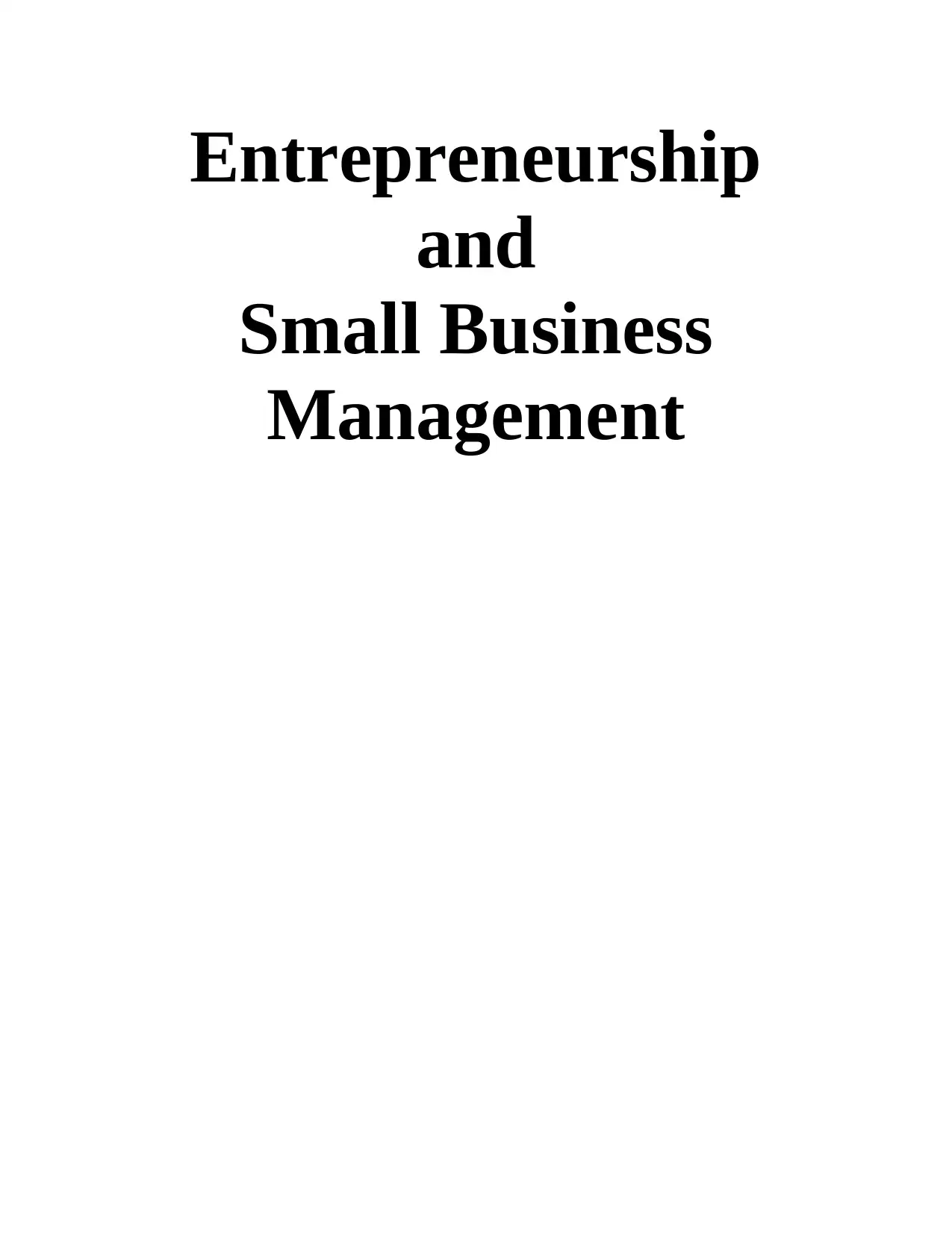
Entrepreneurship
and
Small Business
Management
and
Small Business
Management
Secure Best Marks with AI Grader
Need help grading? Try our AI Grader for instant feedback on your assignments.
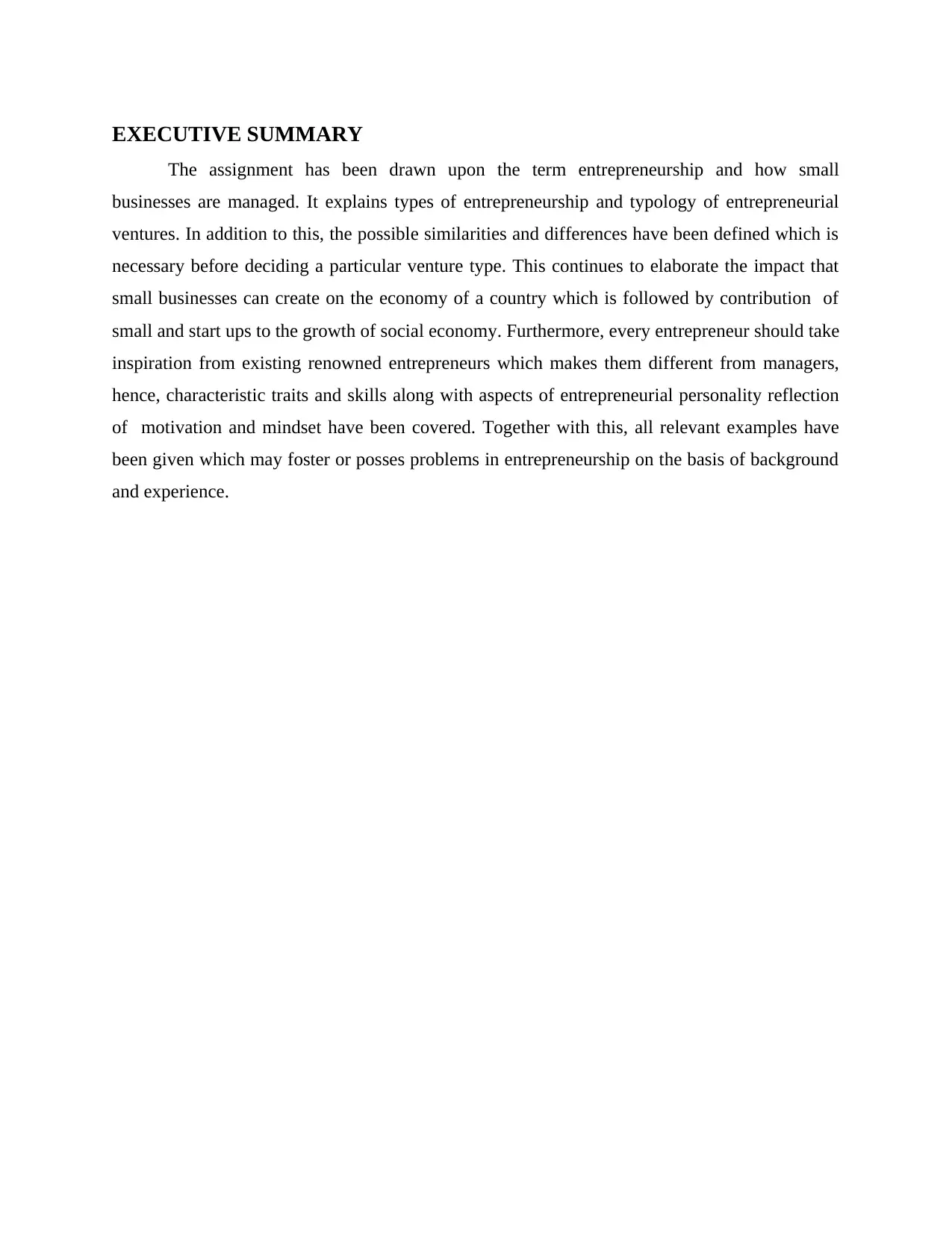
EXECUTIVE SUMMARY
The assignment has been drawn upon the term entrepreneurship and how small
businesses are managed. It explains types of entrepreneurship and typology of entrepreneurial
ventures. In addition to this, the possible similarities and differences have been defined which is
necessary before deciding a particular venture type. This continues to elaborate the impact that
small businesses can create on the economy of a country which is followed by contribution of
small and start ups to the growth of social economy. Furthermore, every entrepreneur should take
inspiration from existing renowned entrepreneurs which makes them different from managers,
hence, characteristic traits and skills along with aspects of entrepreneurial personality reflection
of motivation and mindset have been covered. Together with this, all relevant examples have
been given which may foster or posses problems in entrepreneurship on the basis of background
and experience.
The assignment has been drawn upon the term entrepreneurship and how small
businesses are managed. It explains types of entrepreneurship and typology of entrepreneurial
ventures. In addition to this, the possible similarities and differences have been defined which is
necessary before deciding a particular venture type. This continues to elaborate the impact that
small businesses can create on the economy of a country which is followed by contribution of
small and start ups to the growth of social economy. Furthermore, every entrepreneur should take
inspiration from existing renowned entrepreneurs which makes them different from managers,
hence, characteristic traits and skills along with aspects of entrepreneurial personality reflection
of motivation and mindset have been covered. Together with this, all relevant examples have
been given which may foster or posses problems in entrepreneurship on the basis of background
and experience.
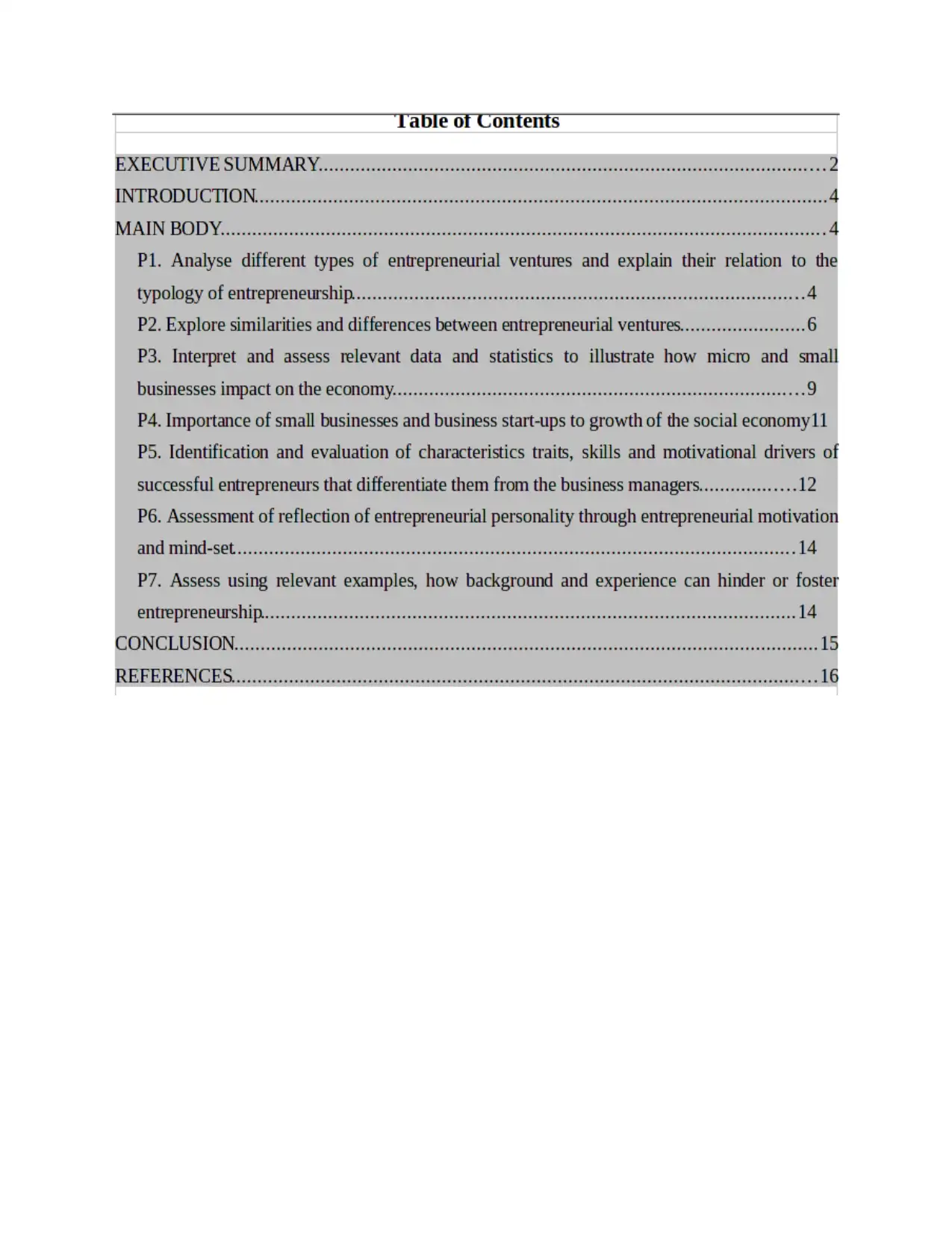
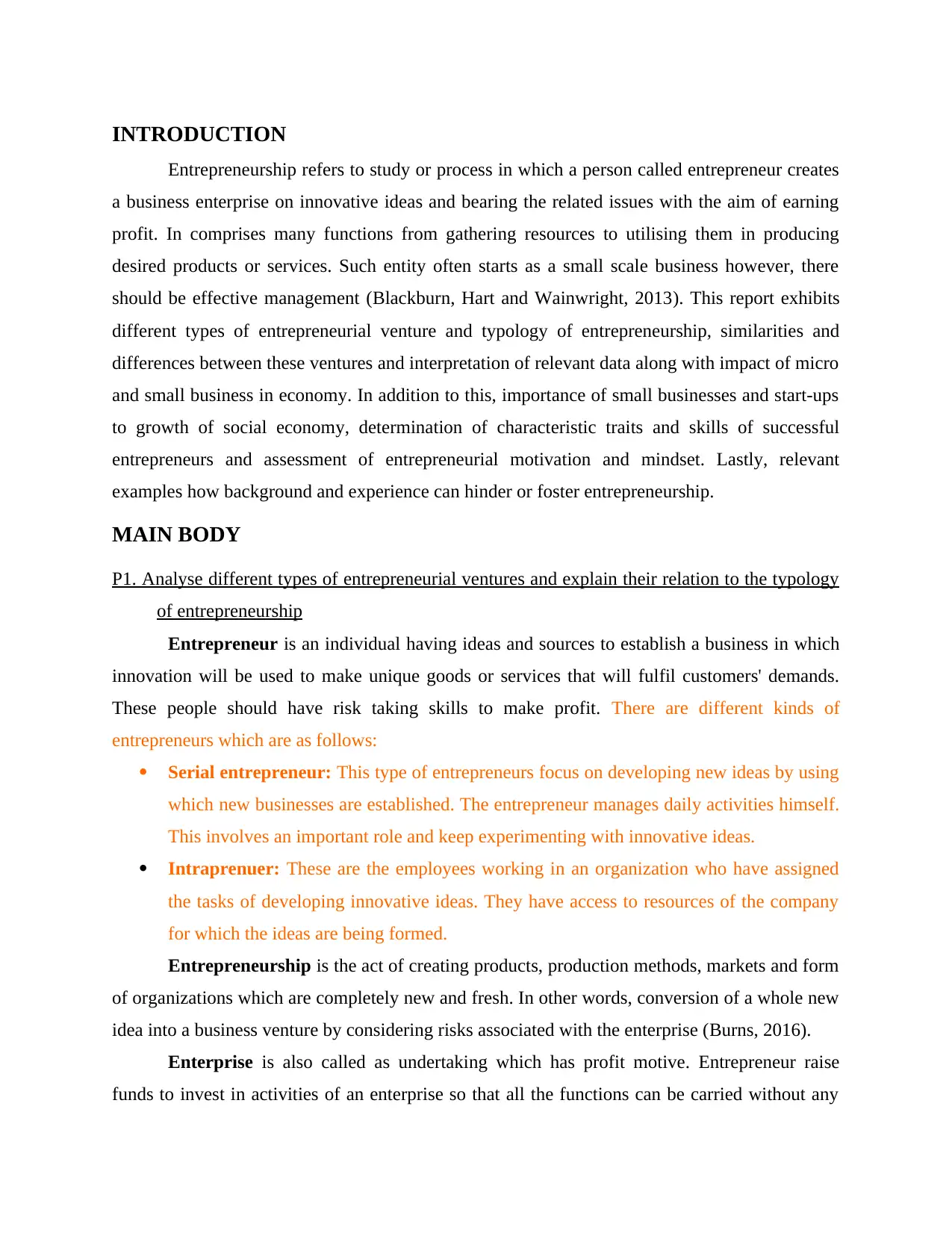
INTRODUCTION
Entrepreneurship refers to study or process in which a person called entrepreneur creates
a business enterprise on innovative ideas and bearing the related issues with the aim of earning
profit. In comprises many functions from gathering resources to utilising them in producing
desired products or services. Such entity often starts as a small scale business however, there
should be effective management (Blackburn, Hart and Wainwright, 2013). This report exhibits
different types of entrepreneurial venture and typology of entrepreneurship, similarities and
differences between these ventures and interpretation of relevant data along with impact of micro
and small business in economy. In addition to this, importance of small businesses and start-ups
to growth of social economy, determination of characteristic traits and skills of successful
entrepreneurs and assessment of entrepreneurial motivation and mindset. Lastly, relevant
examples how background and experience can hinder or foster entrepreneurship.
MAIN BODY
P1. Analyse different types of entrepreneurial ventures and explain their relation to the typology
of entrepreneurship
Entrepreneur is an individual having ideas and sources to establish a business in which
innovation will be used to make unique goods or services that will fulfil customers' demands.
These people should have risk taking skills to make profit. There are different kinds of
entrepreneurs which are as follows:
Serial entrepreneur: This type of entrepreneurs focus on developing new ideas by using
which new businesses are established. The entrepreneur manages daily activities himself.
This involves an important role and keep experimenting with innovative ideas.
Intraprenuer: These are the employees working in an organization who have assigned
the tasks of developing innovative ideas. They have access to resources of the company
for which the ideas are being formed.
Entrepreneurship is the act of creating products, production methods, markets and form
of organizations which are completely new and fresh. In other words, conversion of a whole new
idea into a business venture by considering risks associated with the enterprise (Burns, 2016).
Enterprise is also called as undertaking which has profit motive. Entrepreneur raise
funds to invest in activities of an enterprise so that all the functions can be carried without any
Entrepreneurship refers to study or process in which a person called entrepreneur creates
a business enterprise on innovative ideas and bearing the related issues with the aim of earning
profit. In comprises many functions from gathering resources to utilising them in producing
desired products or services. Such entity often starts as a small scale business however, there
should be effective management (Blackburn, Hart and Wainwright, 2013). This report exhibits
different types of entrepreneurial venture and typology of entrepreneurship, similarities and
differences between these ventures and interpretation of relevant data along with impact of micro
and small business in economy. In addition to this, importance of small businesses and start-ups
to growth of social economy, determination of characteristic traits and skills of successful
entrepreneurs and assessment of entrepreneurial motivation and mindset. Lastly, relevant
examples how background and experience can hinder or foster entrepreneurship.
MAIN BODY
P1. Analyse different types of entrepreneurial ventures and explain their relation to the typology
of entrepreneurship
Entrepreneur is an individual having ideas and sources to establish a business in which
innovation will be used to make unique goods or services that will fulfil customers' demands.
These people should have risk taking skills to make profit. There are different kinds of
entrepreneurs which are as follows:
Serial entrepreneur: This type of entrepreneurs focus on developing new ideas by using
which new businesses are established. The entrepreneur manages daily activities himself.
This involves an important role and keep experimenting with innovative ideas.
Intraprenuer: These are the employees working in an organization who have assigned
the tasks of developing innovative ideas. They have access to resources of the company
for which the ideas are being formed.
Entrepreneurship is the act of creating products, production methods, markets and form
of organizations which are completely new and fresh. In other words, conversion of a whole new
idea into a business venture by considering risks associated with the enterprise (Burns, 2016).
Enterprise is also called as undertaking which has profit motive. Entrepreneur raise
funds to invest in activities of an enterprise so that all the functions can be carried without any
Secure Best Marks with AI Grader
Need help grading? Try our AI Grader for instant feedback on your assignments.
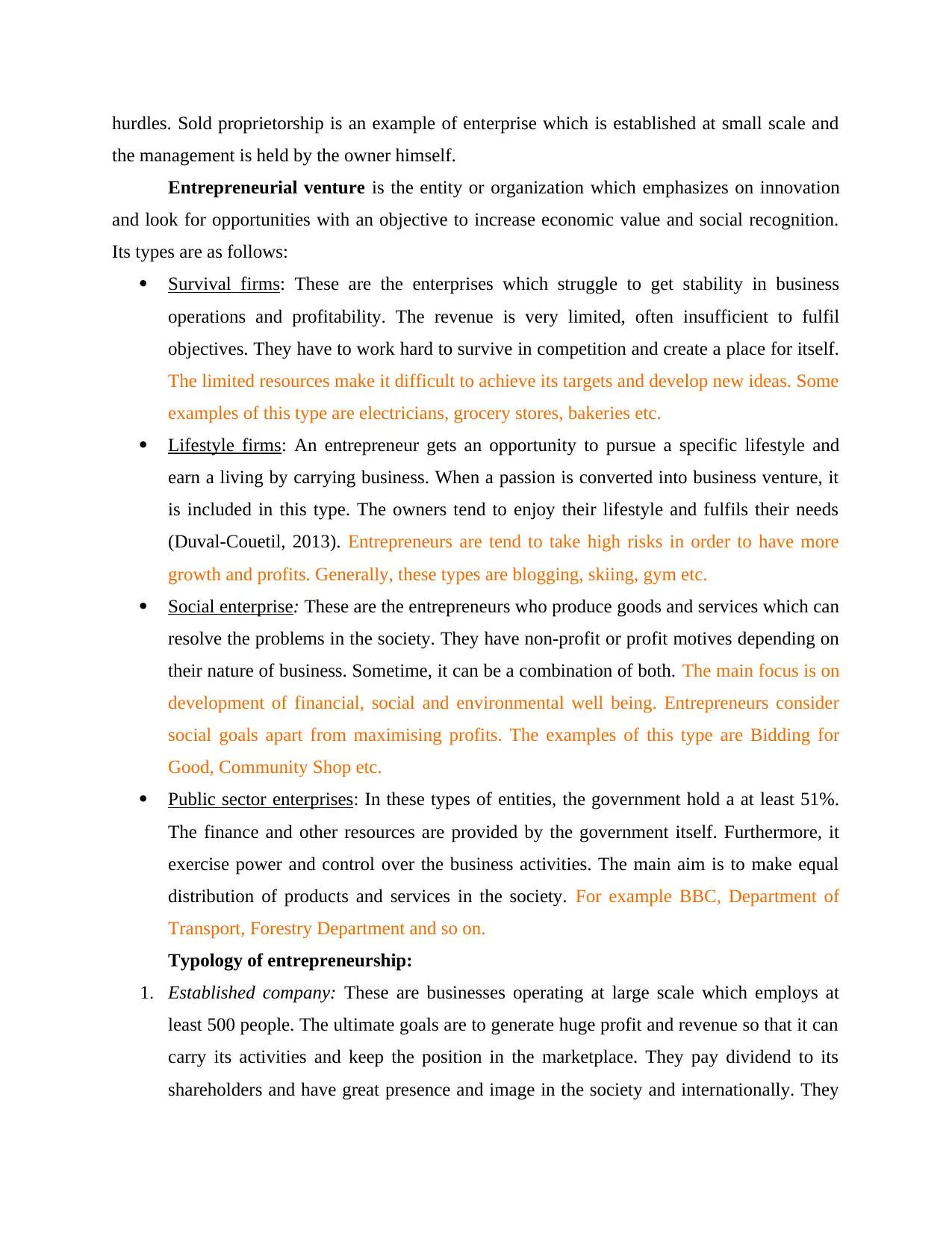
hurdles. Sold proprietorship is an example of enterprise which is established at small scale and
the management is held by the owner himself.
Entrepreneurial venture is the entity or organization which emphasizes on innovation
and look for opportunities with an objective to increase economic value and social recognition.
Its types are as follows:
Survival firms: These are the enterprises which struggle to get stability in business
operations and profitability. The revenue is very limited, often insufficient to fulfil
objectives. They have to work hard to survive in competition and create a place for itself.
The limited resources make it difficult to achieve its targets and develop new ideas. Some
examples of this type are electricians, grocery stores, bakeries etc.
Lifestyle firms: An entrepreneur gets an opportunity to pursue a specific lifestyle and
earn a living by carrying business. When a passion is converted into business venture, it
is included in this type. The owners tend to enjoy their lifestyle and fulfils their needs
(Duval‐Couetil, 2013). Entrepreneurs are tend to take high risks in order to have more
growth and profits. Generally, these types are blogging, skiing, gym etc.
Social enterprise: These are the entrepreneurs who produce goods and services which can
resolve the problems in the society. They have non-profit or profit motives depending on
their nature of business. Sometime, it can be a combination of both. The main focus is on
development of financial, social and environmental well being. Entrepreneurs consider
social goals apart from maximising profits. The examples of this type are Bidding for
Good, Community Shop etc.
Public sector enterprises: In these types of entities, the government hold a at least 51%.
The finance and other resources are provided by the government itself. Furthermore, it
exercise power and control over the business activities. The main aim is to make equal
distribution of products and services in the society. For example BBC, Department of
Transport, Forestry Department and so on.
Typology of entrepreneurship:
1. Established company: These are businesses operating at large scale which employs at
least 500 people. The ultimate goals are to generate huge profit and revenue so that it can
carry its activities and keep the position in the marketplace. They pay dividend to its
shareholders and have great presence and image in the society and internationally. They
the management is held by the owner himself.
Entrepreneurial venture is the entity or organization which emphasizes on innovation
and look for opportunities with an objective to increase economic value and social recognition.
Its types are as follows:
Survival firms: These are the enterprises which struggle to get stability in business
operations and profitability. The revenue is very limited, often insufficient to fulfil
objectives. They have to work hard to survive in competition and create a place for itself.
The limited resources make it difficult to achieve its targets and develop new ideas. Some
examples of this type are electricians, grocery stores, bakeries etc.
Lifestyle firms: An entrepreneur gets an opportunity to pursue a specific lifestyle and
earn a living by carrying business. When a passion is converted into business venture, it
is included in this type. The owners tend to enjoy their lifestyle and fulfils their needs
(Duval‐Couetil, 2013). Entrepreneurs are tend to take high risks in order to have more
growth and profits. Generally, these types are blogging, skiing, gym etc.
Social enterprise: These are the entrepreneurs who produce goods and services which can
resolve the problems in the society. They have non-profit or profit motives depending on
their nature of business. Sometime, it can be a combination of both. The main focus is on
development of financial, social and environmental well being. Entrepreneurs consider
social goals apart from maximising profits. The examples of this type are Bidding for
Good, Community Shop etc.
Public sector enterprises: In these types of entities, the government hold a at least 51%.
The finance and other resources are provided by the government itself. Furthermore, it
exercise power and control over the business activities. The main aim is to make equal
distribution of products and services in the society. For example BBC, Department of
Transport, Forestry Department and so on.
Typology of entrepreneurship:
1. Established company: These are businesses operating at large scale which employs at
least 500 people. The ultimate goals are to generate huge profit and revenue so that it can
carry its activities and keep the position in the marketplace. They pay dividend to its
shareholders and have great presence and image in the society and internationally. They
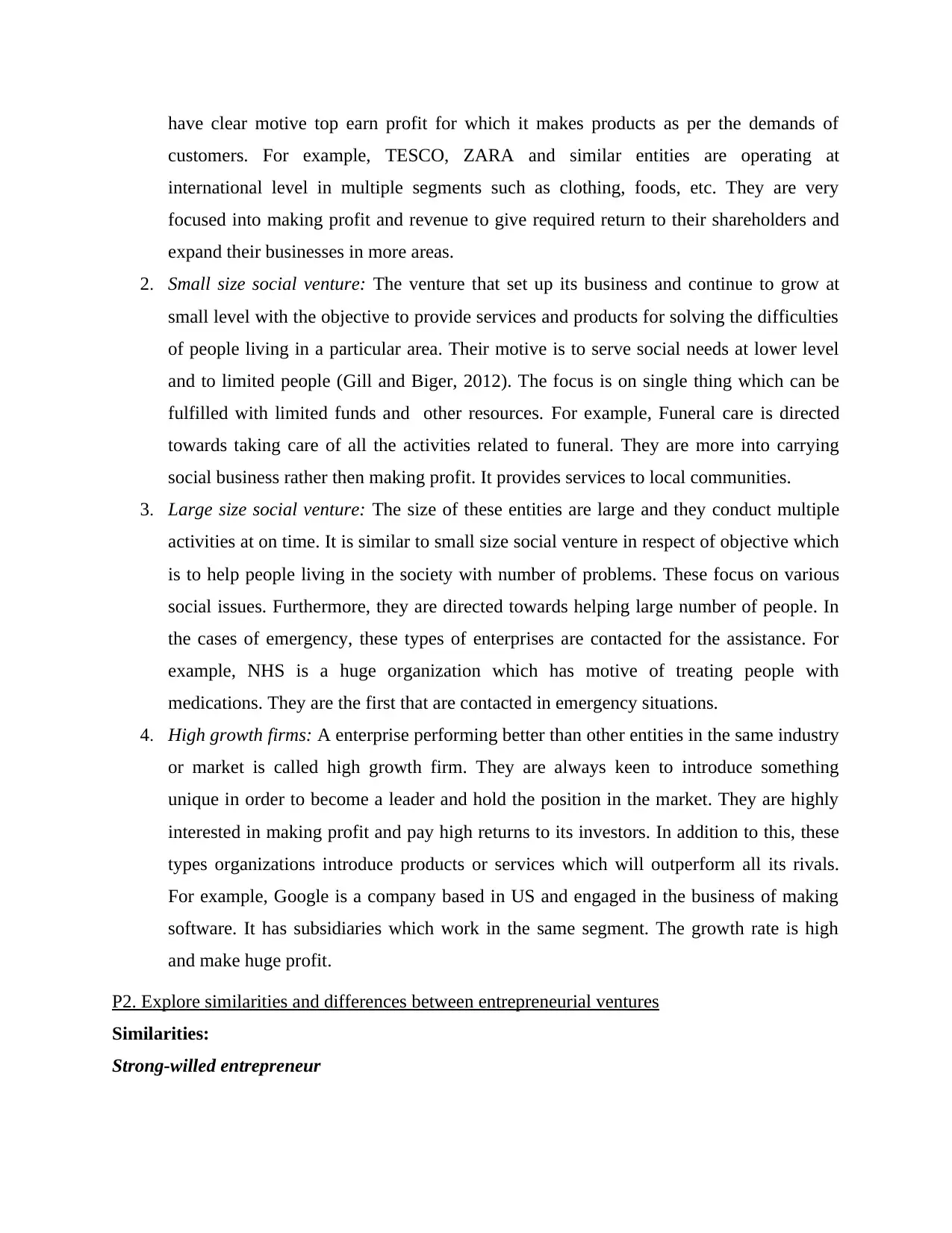
have clear motive top earn profit for which it makes products as per the demands of
customers. For example, TESCO, ZARA and similar entities are operating at
international level in multiple segments such as clothing, foods, etc. They are very
focused into making profit and revenue to give required return to their shareholders and
expand their businesses in more areas.
2. Small size social venture: The venture that set up its business and continue to grow at
small level with the objective to provide services and products for solving the difficulties
of people living in a particular area. Their motive is to serve social needs at lower level
and to limited people (Gill and Biger, 2012). The focus is on single thing which can be
fulfilled with limited funds and other resources. For example, Funeral care is directed
towards taking care of all the activities related to funeral. They are more into carrying
social business rather then making profit. It provides services to local communities.
3. Large size social venture: The size of these entities are large and they conduct multiple
activities at on time. It is similar to small size social venture in respect of objective which
is to help people living in the society with number of problems. These focus on various
social issues. Furthermore, they are directed towards helping large number of people. In
the cases of emergency, these types of enterprises are contacted for the assistance. For
example, NHS is a huge organization which has motive of treating people with
medications. They are the first that are contacted in emergency situations.
4. High growth firms: A enterprise performing better than other entities in the same industry
or market is called high growth firm. They are always keen to introduce something
unique in order to become a leader and hold the position in the market. They are highly
interested in making profit and pay high returns to its investors. In addition to this, these
types organizations introduce products or services which will outperform all its rivals.
For example, Google is a company based in US and engaged in the business of making
software. It has subsidiaries which work in the same segment. The growth rate is high
and make huge profit.
P2. Explore similarities and differences between entrepreneurial ventures
Similarities:
Strong-willed entrepreneur
customers. For example, TESCO, ZARA and similar entities are operating at
international level in multiple segments such as clothing, foods, etc. They are very
focused into making profit and revenue to give required return to their shareholders and
expand their businesses in more areas.
2. Small size social venture: The venture that set up its business and continue to grow at
small level with the objective to provide services and products for solving the difficulties
of people living in a particular area. Their motive is to serve social needs at lower level
and to limited people (Gill and Biger, 2012). The focus is on single thing which can be
fulfilled with limited funds and other resources. For example, Funeral care is directed
towards taking care of all the activities related to funeral. They are more into carrying
social business rather then making profit. It provides services to local communities.
3. Large size social venture: The size of these entities are large and they conduct multiple
activities at on time. It is similar to small size social venture in respect of objective which
is to help people living in the society with number of problems. These focus on various
social issues. Furthermore, they are directed towards helping large number of people. In
the cases of emergency, these types of enterprises are contacted for the assistance. For
example, NHS is a huge organization which has motive of treating people with
medications. They are the first that are contacted in emergency situations.
4. High growth firms: A enterprise performing better than other entities in the same industry
or market is called high growth firm. They are always keen to introduce something
unique in order to become a leader and hold the position in the market. They are highly
interested in making profit and pay high returns to its investors. In addition to this, these
types organizations introduce products or services which will outperform all its rivals.
For example, Google is a company based in US and engaged in the business of making
software. It has subsidiaries which work in the same segment. The growth rate is high
and make huge profit.
P2. Explore similarities and differences between entrepreneurial ventures
Similarities:
Strong-willed entrepreneur
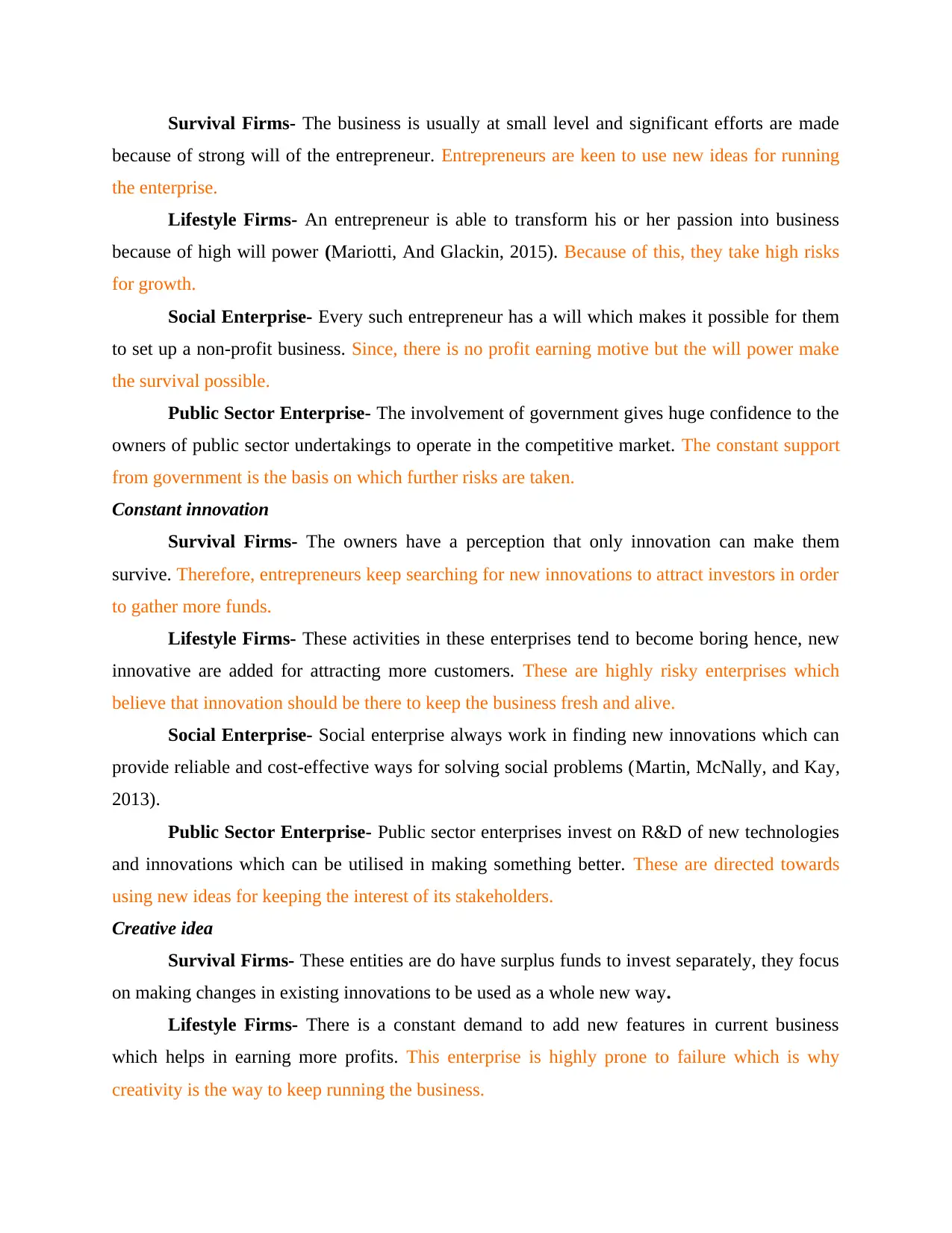
Survival Firms- The business is usually at small level and significant efforts are made
because of strong will of the entrepreneur. Entrepreneurs are keen to use new ideas for running
the enterprise.
Lifestyle Firms- An entrepreneur is able to transform his or her passion into business
because of high will power (Mariotti, And Glackin, 2015). Because of this, they take high risks
for growth.
Social Enterprise- Every such entrepreneur has a will which makes it possible for them
to set up a non-profit business. Since, there is no profit earning motive but the will power make
the survival possible.
Public Sector Enterprise- The involvement of government gives huge confidence to the
owners of public sector undertakings to operate in the competitive market. The constant support
from government is the basis on which further risks are taken.
Constant innovation
Survival Firms- The owners have a perception that only innovation can make them
survive. Therefore, entrepreneurs keep searching for new innovations to attract investors in order
to gather more funds.
Lifestyle Firms- These activities in these enterprises tend to become boring hence, new
innovative are added for attracting more customers. These are highly risky enterprises which
believe that innovation should be there to keep the business fresh and alive.
Social Enterprise- Social enterprise always work in finding new innovations which can
provide reliable and cost-effective ways for solving social problems (Martin, McNally, and Kay,
2013).
Public Sector Enterprise- Public sector enterprises invest on R&D of new technologies
and innovations which can be utilised in making something better. These are directed towards
using new ideas for keeping the interest of its stakeholders.
Creative idea
Survival Firms- These entities are do have surplus funds to invest separately, they focus
on making changes in existing innovations to be used as a whole new way.
Lifestyle Firms- There is a constant demand to add new features in current business
which helps in earning more profits. This enterprise is highly prone to failure which is why
creativity is the way to keep running the business.
because of strong will of the entrepreneur. Entrepreneurs are keen to use new ideas for running
the enterprise.
Lifestyle Firms- An entrepreneur is able to transform his or her passion into business
because of high will power (Mariotti, And Glackin, 2015). Because of this, they take high risks
for growth.
Social Enterprise- Every such entrepreneur has a will which makes it possible for them
to set up a non-profit business. Since, there is no profit earning motive but the will power make
the survival possible.
Public Sector Enterprise- The involvement of government gives huge confidence to the
owners of public sector undertakings to operate in the competitive market. The constant support
from government is the basis on which further risks are taken.
Constant innovation
Survival Firms- The owners have a perception that only innovation can make them
survive. Therefore, entrepreneurs keep searching for new innovations to attract investors in order
to gather more funds.
Lifestyle Firms- These activities in these enterprises tend to become boring hence, new
innovative are added for attracting more customers. These are highly risky enterprises which
believe that innovation should be there to keep the business fresh and alive.
Social Enterprise- Social enterprise always work in finding new innovations which can
provide reliable and cost-effective ways for solving social problems (Martin, McNally, and Kay,
2013).
Public Sector Enterprise- Public sector enterprises invest on R&D of new technologies
and innovations which can be utilised in making something better. These are directed towards
using new ideas for keeping the interest of its stakeholders.
Creative idea
Survival Firms- These entities are do have surplus funds to invest separately, they focus
on making changes in existing innovations to be used as a whole new way.
Lifestyle Firms- There is a constant demand to add new features in current business
which helps in earning more profits. This enterprise is highly prone to failure which is why
creativity is the way to keep running the business.
Paraphrase This Document
Need a fresh take? Get an instant paraphrase of this document with our AI Paraphraser
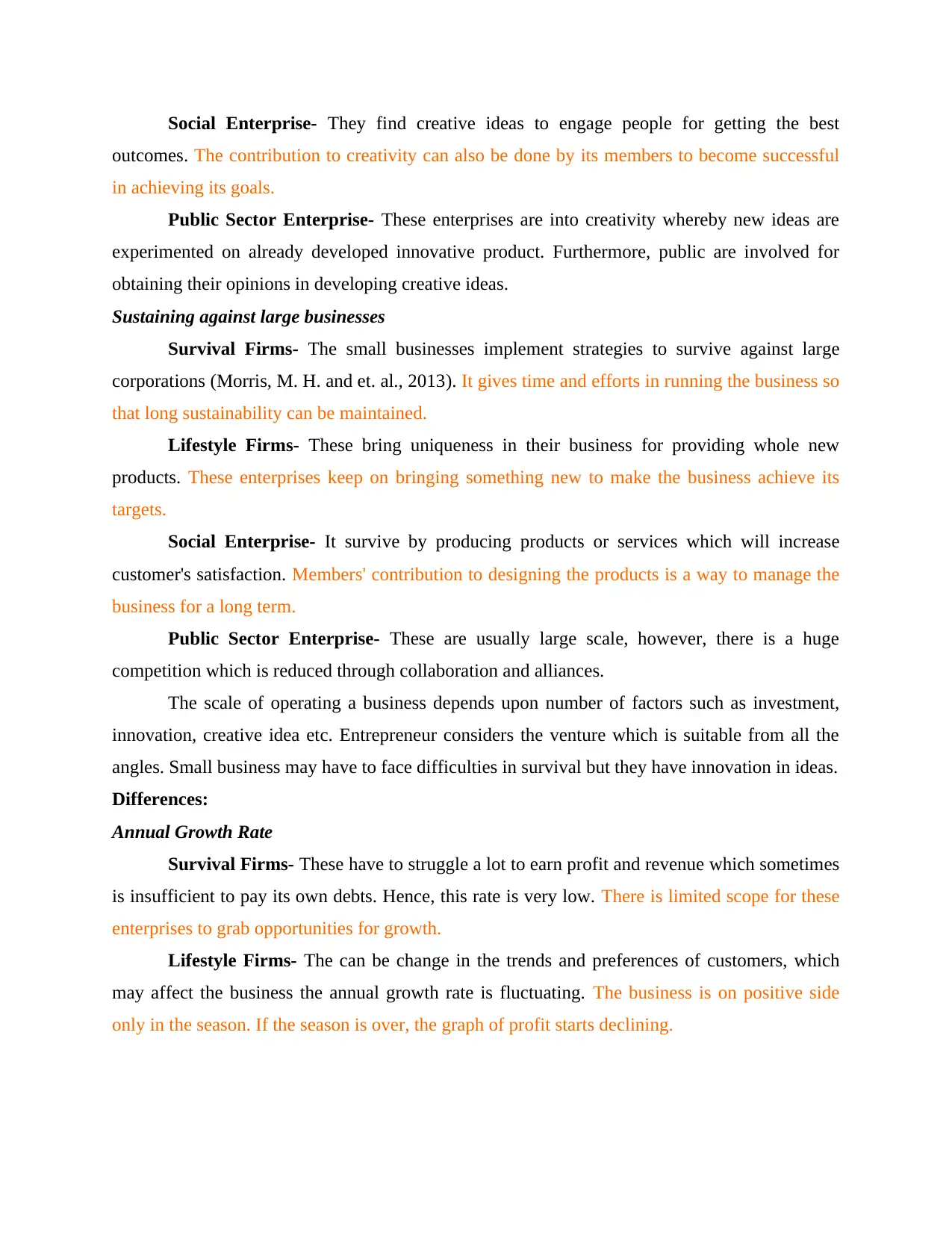
Social Enterprise- They find creative ideas to engage people for getting the best
outcomes. The contribution to creativity can also be done by its members to become successful
in achieving its goals.
Public Sector Enterprise- These enterprises are into creativity whereby new ideas are
experimented on already developed innovative product. Furthermore, public are involved for
obtaining their opinions in developing creative ideas.
Sustaining against large businesses
Survival Firms- The small businesses implement strategies to survive against large
corporations (Morris, M. H. and et. al., 2013). It gives time and efforts in running the business so
that long sustainability can be maintained.
Lifestyle Firms- These bring uniqueness in their business for providing whole new
products. These enterprises keep on bringing something new to make the business achieve its
targets.
Social Enterprise- It survive by producing products or services which will increase
customer's satisfaction. Members' contribution to designing the products is a way to manage the
business for a long term.
Public Sector Enterprise- These are usually large scale, however, there is a huge
competition which is reduced through collaboration and alliances.
The scale of operating a business depends upon number of factors such as investment,
innovation, creative idea etc. Entrepreneur considers the venture which is suitable from all the
angles. Small business may have to face difficulties in survival but they have innovation in ideas.
Differences:
Annual Growth Rate
Survival Firms- These have to struggle a lot to earn profit and revenue which sometimes
is insufficient to pay its own debts. Hence, this rate is very low. There is limited scope for these
enterprises to grab opportunities for growth.
Lifestyle Firms- The can be change in the trends and preferences of customers, which
may affect the business the annual growth rate is fluctuating. The business is on positive side
only in the season. If the season is over, the graph of profit starts declining.
outcomes. The contribution to creativity can also be done by its members to become successful
in achieving its goals.
Public Sector Enterprise- These enterprises are into creativity whereby new ideas are
experimented on already developed innovative product. Furthermore, public are involved for
obtaining their opinions in developing creative ideas.
Sustaining against large businesses
Survival Firms- The small businesses implement strategies to survive against large
corporations (Morris, M. H. and et. al., 2013). It gives time and efforts in running the business so
that long sustainability can be maintained.
Lifestyle Firms- These bring uniqueness in their business for providing whole new
products. These enterprises keep on bringing something new to make the business achieve its
targets.
Social Enterprise- It survive by producing products or services which will increase
customer's satisfaction. Members' contribution to designing the products is a way to manage the
business for a long term.
Public Sector Enterprise- These are usually large scale, however, there is a huge
competition which is reduced through collaboration and alliances.
The scale of operating a business depends upon number of factors such as investment,
innovation, creative idea etc. Entrepreneur considers the venture which is suitable from all the
angles. Small business may have to face difficulties in survival but they have innovation in ideas.
Differences:
Annual Growth Rate
Survival Firms- These have to struggle a lot to earn profit and revenue which sometimes
is insufficient to pay its own debts. Hence, this rate is very low. There is limited scope for these
enterprises to grab opportunities for growth.
Lifestyle Firms- The can be change in the trends and preferences of customers, which
may affect the business the annual growth rate is fluctuating. The business is on positive side
only in the season. If the season is over, the graph of profit starts declining.
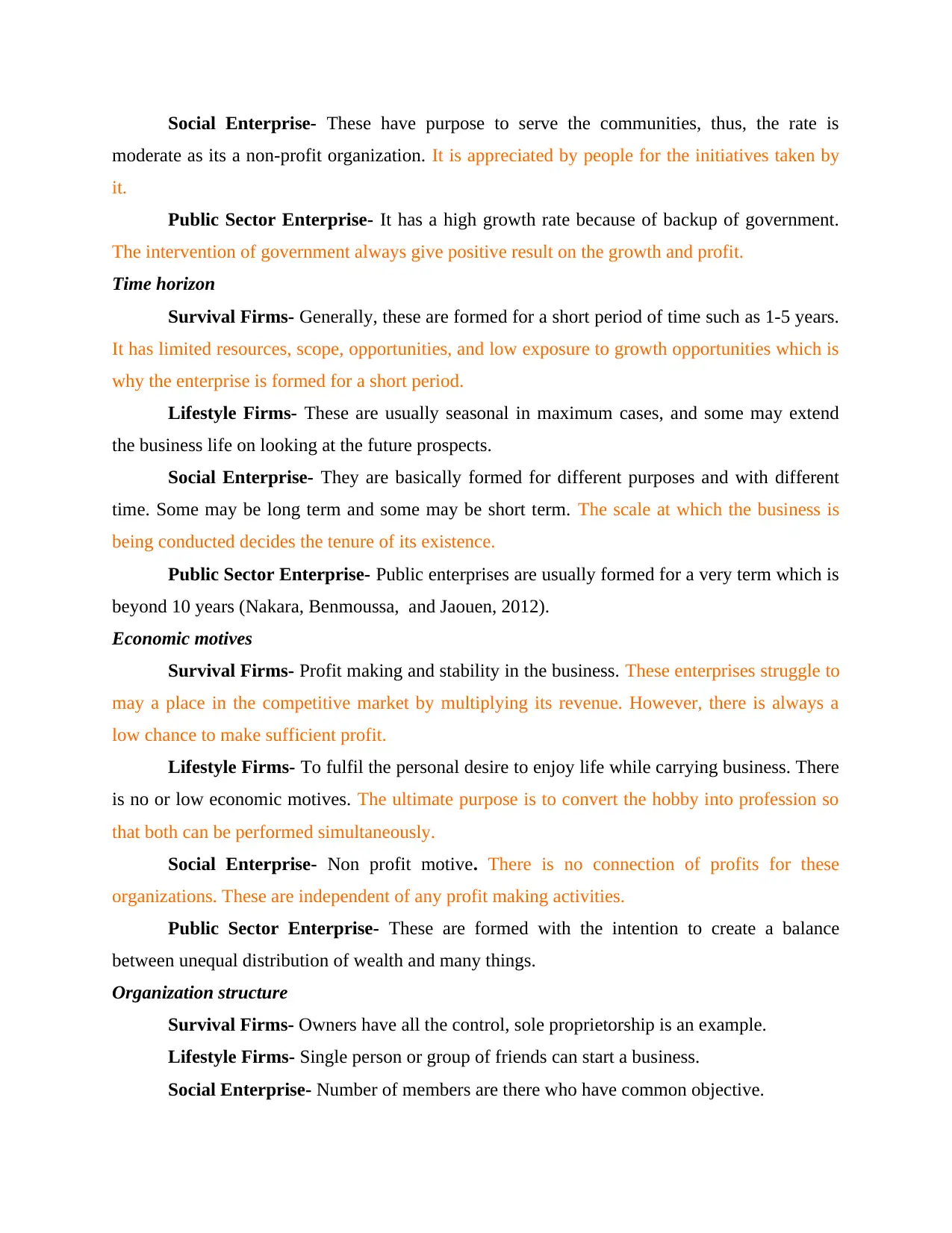
Social Enterprise- These have purpose to serve the communities, thus, the rate is
moderate as its a non-profit organization. It is appreciated by people for the initiatives taken by
it.
Public Sector Enterprise- It has a high growth rate because of backup of government.
The intervention of government always give positive result on the growth and profit.
Time horizon
Survival Firms- Generally, these are formed for a short period of time such as 1-5 years.
It has limited resources, scope, opportunities, and low exposure to growth opportunities which is
why the enterprise is formed for a short period.
Lifestyle Firms- These are usually seasonal in maximum cases, and some may extend
the business life on looking at the future prospects.
Social Enterprise- They are basically formed for different purposes and with different
time. Some may be long term and some may be short term. The scale at which the business is
being conducted decides the tenure of its existence.
Public Sector Enterprise- Public enterprises are usually formed for a very term which is
beyond 10 years (Nakara, Benmoussa, and Jaouen, 2012).
Economic motives
Survival Firms- Profit making and stability in the business. These enterprises struggle to
may a place in the competitive market by multiplying its revenue. However, there is always a
low chance to make sufficient profit.
Lifestyle Firms- To fulfil the personal desire to enjoy life while carrying business. There
is no or low economic motives. The ultimate purpose is to convert the hobby into profession so
that both can be performed simultaneously.
Social Enterprise- Non profit motive. There is no connection of profits for these
organizations. These are independent of any profit making activities.
Public Sector Enterprise- These are formed with the intention to create a balance
between unequal distribution of wealth and many things.
Organization structure
Survival Firms- Owners have all the control, sole proprietorship is an example.
Lifestyle Firms- Single person or group of friends can start a business.
Social Enterprise- Number of members are there who have common objective.
moderate as its a non-profit organization. It is appreciated by people for the initiatives taken by
it.
Public Sector Enterprise- It has a high growth rate because of backup of government.
The intervention of government always give positive result on the growth and profit.
Time horizon
Survival Firms- Generally, these are formed for a short period of time such as 1-5 years.
It has limited resources, scope, opportunities, and low exposure to growth opportunities which is
why the enterprise is formed for a short period.
Lifestyle Firms- These are usually seasonal in maximum cases, and some may extend
the business life on looking at the future prospects.
Social Enterprise- They are basically formed for different purposes and with different
time. Some may be long term and some may be short term. The scale at which the business is
being conducted decides the tenure of its existence.
Public Sector Enterprise- Public enterprises are usually formed for a very term which is
beyond 10 years (Nakara, Benmoussa, and Jaouen, 2012).
Economic motives
Survival Firms- Profit making and stability in the business. These enterprises struggle to
may a place in the competitive market by multiplying its revenue. However, there is always a
low chance to make sufficient profit.
Lifestyle Firms- To fulfil the personal desire to enjoy life while carrying business. There
is no or low economic motives. The ultimate purpose is to convert the hobby into profession so
that both can be performed simultaneously.
Social Enterprise- Non profit motive. There is no connection of profits for these
organizations. These are independent of any profit making activities.
Public Sector Enterprise- These are formed with the intention to create a balance
between unequal distribution of wealth and many things.
Organization structure
Survival Firms- Owners have all the control, sole proprietorship is an example.
Lifestyle Firms- Single person or group of friends can start a business.
Social Enterprise- Number of members are there who have common objective.
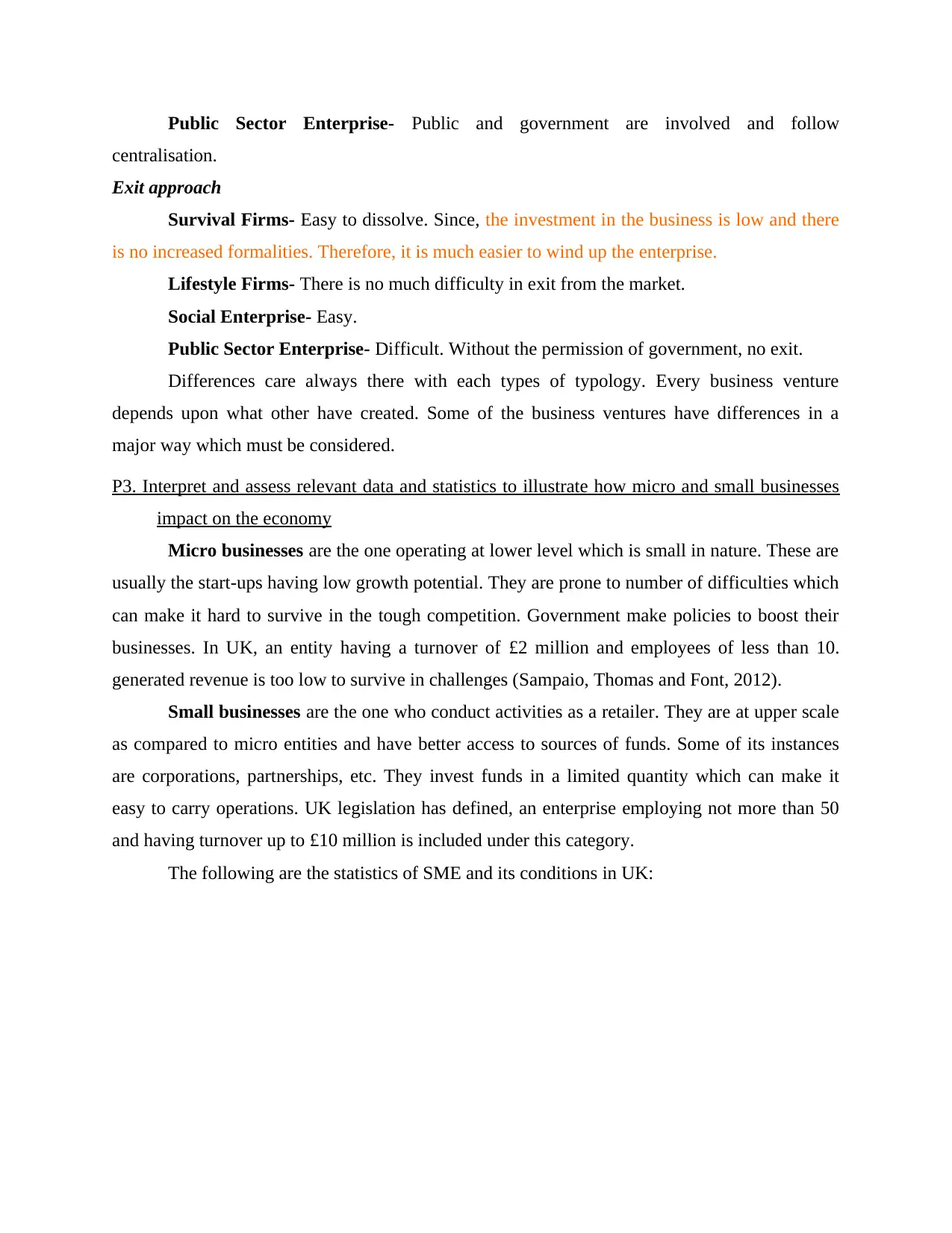
Public Sector Enterprise- Public and government are involved and follow
centralisation.
Exit approach
Survival Firms- Easy to dissolve. Since, the investment in the business is low and there
is no increased formalities. Therefore, it is much easier to wind up the enterprise.
Lifestyle Firms- There is no much difficulty in exit from the market.
Social Enterprise- Easy.
Public Sector Enterprise- Difficult. Without the permission of government, no exit.
Differences care always there with each types of typology. Every business venture
depends upon what other have created. Some of the business ventures have differences in a
major way which must be considered.
P3. Interpret and assess relevant data and statistics to illustrate how micro and small businesses
impact on the economy
Micro businesses are the one operating at lower level which is small in nature. These are
usually the start-ups having low growth potential. They are prone to number of difficulties which
can make it hard to survive in the tough competition. Government make policies to boost their
businesses. In UK, an entity having a turnover of £2 million and employees of less than 10.
generated revenue is too low to survive in challenges (Sampaio, Thomas and Font, 2012).
Small businesses are the one who conduct activities as a retailer. They are at upper scale
as compared to micro entities and have better access to sources of funds. Some of its instances
are corporations, partnerships, etc. They invest funds in a limited quantity which can make it
easy to carry operations. UK legislation has defined, an enterprise employing not more than 50
and having turnover up to £10 million is included under this category.
The following are the statistics of SME and its conditions in UK:
centralisation.
Exit approach
Survival Firms- Easy to dissolve. Since, the investment in the business is low and there
is no increased formalities. Therefore, it is much easier to wind up the enterprise.
Lifestyle Firms- There is no much difficulty in exit from the market.
Social Enterprise- Easy.
Public Sector Enterprise- Difficult. Without the permission of government, no exit.
Differences care always there with each types of typology. Every business venture
depends upon what other have created. Some of the business ventures have differences in a
major way which must be considered.
P3. Interpret and assess relevant data and statistics to illustrate how micro and small businesses
impact on the economy
Micro businesses are the one operating at lower level which is small in nature. These are
usually the start-ups having low growth potential. They are prone to number of difficulties which
can make it hard to survive in the tough competition. Government make policies to boost their
businesses. In UK, an entity having a turnover of £2 million and employees of less than 10.
generated revenue is too low to survive in challenges (Sampaio, Thomas and Font, 2012).
Small businesses are the one who conduct activities as a retailer. They are at upper scale
as compared to micro entities and have better access to sources of funds. Some of its instances
are corporations, partnerships, etc. They invest funds in a limited quantity which can make it
easy to carry operations. UK legislation has defined, an enterprise employing not more than 50
and having turnover up to £10 million is included under this category.
The following are the statistics of SME and its conditions in UK:
Secure Best Marks with AI Grader
Need help grading? Try our AI Grader for instant feedback on your assignments.
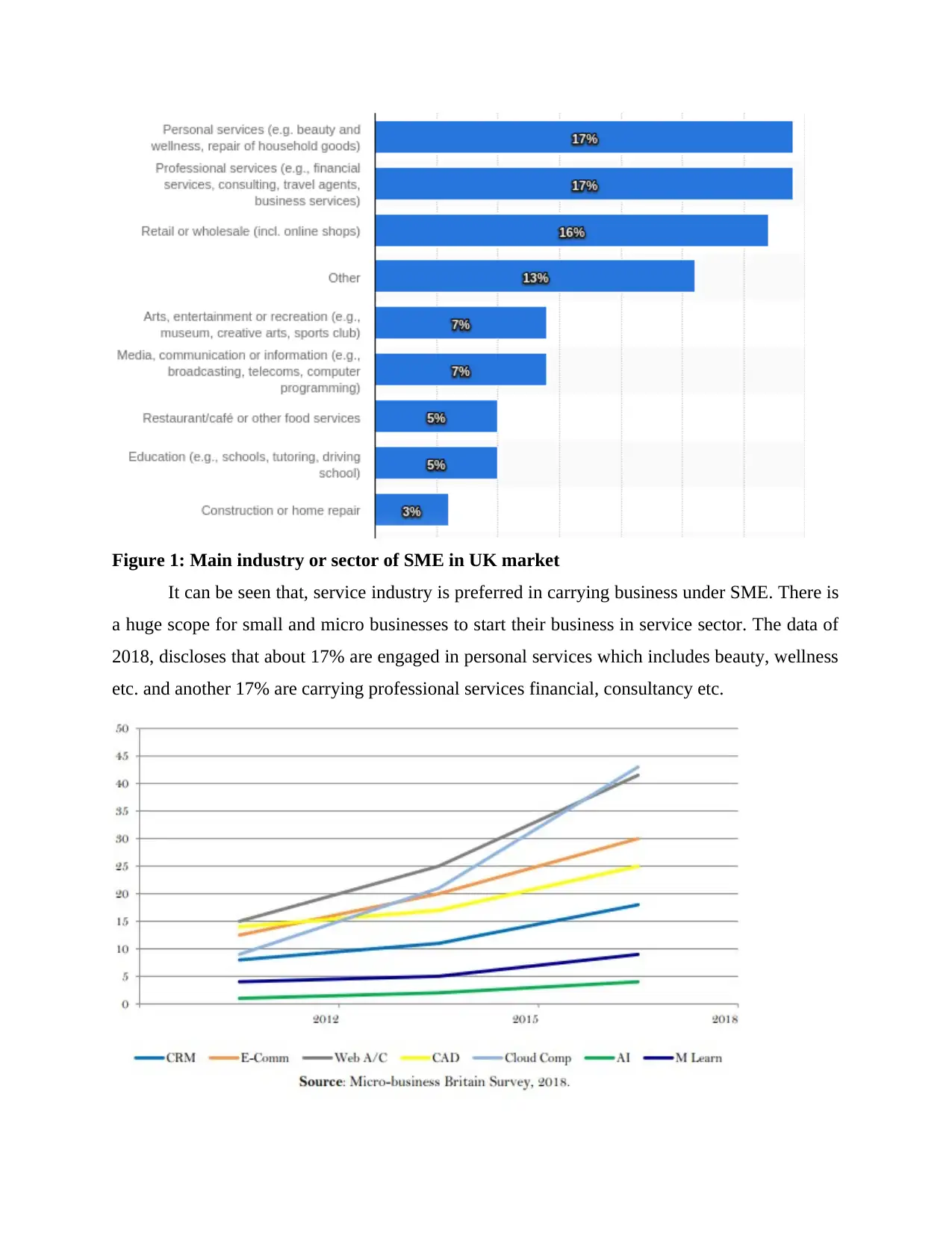
Figure 1: Main industry or sector of SME in UK market
It can be seen that, service industry is preferred in carrying business under SME. There is
a huge scope for small and micro businesses to start their business in service sector. The data of
2018, discloses that about 17% are engaged in personal services which includes beauty, wellness
etc. and another 17% are carrying professional services financial, consultancy etc.
It can be seen that, service industry is preferred in carrying business under SME. There is
a huge scope for small and micro businesses to start their business in service sector. The data of
2018, discloses that about 17% are engaged in personal services which includes beauty, wellness
etc. and another 17% are carrying professional services financial, consultancy etc.
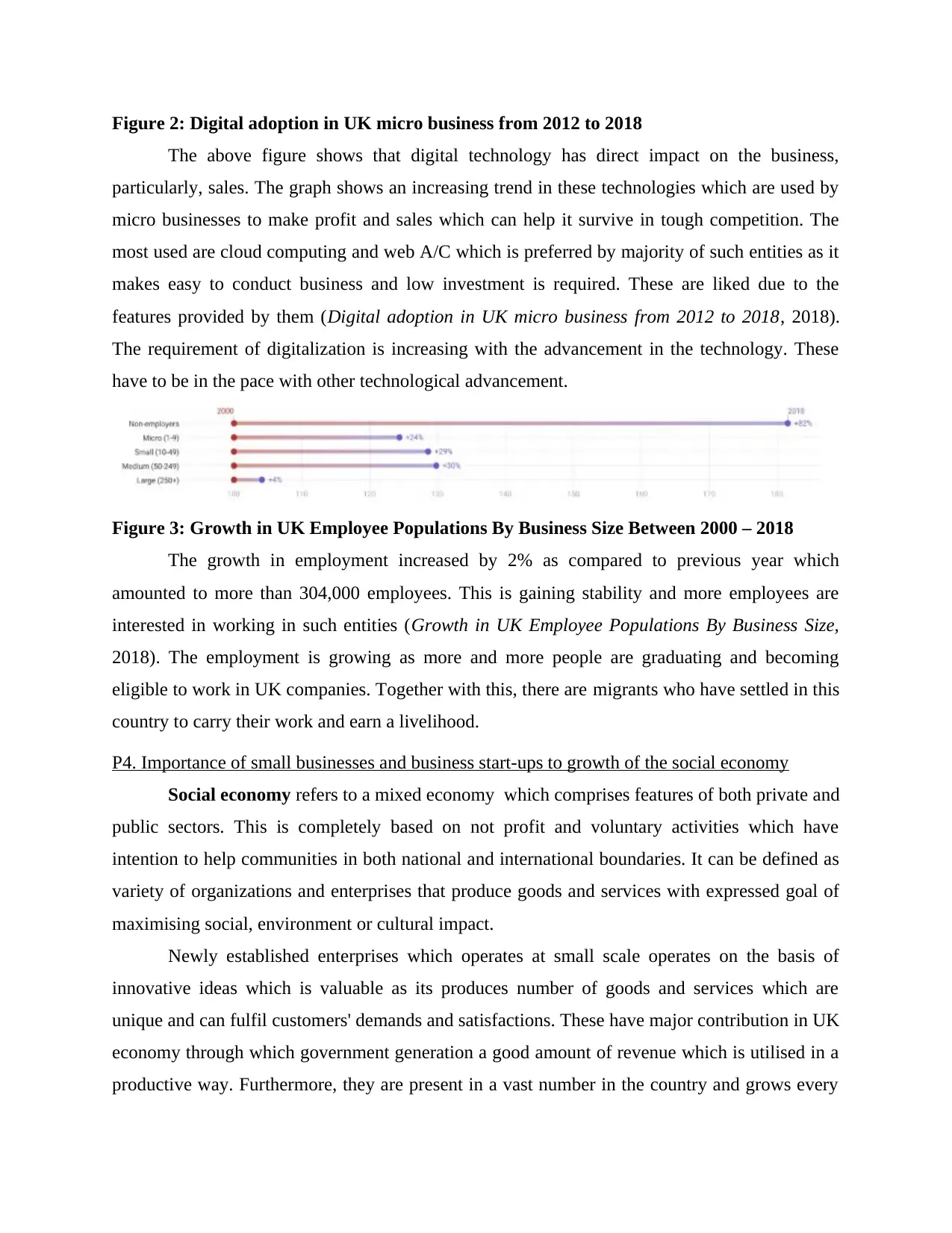
Figure 2: Digital adoption in UK micro business from 2012 to 2018
The above figure shows that digital technology has direct impact on the business,
particularly, sales. The graph shows an increasing trend in these technologies which are used by
micro businesses to make profit and sales which can help it survive in tough competition. The
most used are cloud computing and web A/C which is preferred by majority of such entities as it
makes easy to conduct business and low investment is required. These are liked due to the
features provided by them (Digital adoption in UK micro business from 2012 to 2018, 2018).
The requirement of digitalization is increasing with the advancement in the technology. These
have to be in the pace with other technological advancement.
Figure 3: Growth in UK Employee Populations By Business Size Between 2000 – 2018
The growth in employment increased by 2% as compared to previous year which
amounted to more than 304,000 employees. This is gaining stability and more employees are
interested in working in such entities (Growth in UK Employee Populations By Business Size,
2018). The employment is growing as more and more people are graduating and becoming
eligible to work in UK companies. Together with this, there are migrants who have settled in this
country to carry their work and earn a livelihood.
P4. Importance of small businesses and business start-ups to growth of the social economy
Social economy refers to a mixed economy which comprises features of both private and
public sectors. This is completely based on not profit and voluntary activities which have
intention to help communities in both national and international boundaries. It can be defined as
variety of organizations and enterprises that produce goods and services with expressed goal of
maximising social, environment or cultural impact.
Newly established enterprises which operates at small scale operates on the basis of
innovative ideas which is valuable as its produces number of goods and services which are
unique and can fulfil customers' demands and satisfactions. These have major contribution in UK
economy through which government generation a good amount of revenue which is utilised in a
productive way. Furthermore, they are present in a vast number in the country and grows every
The above figure shows that digital technology has direct impact on the business,
particularly, sales. The graph shows an increasing trend in these technologies which are used by
micro businesses to make profit and sales which can help it survive in tough competition. The
most used are cloud computing and web A/C which is preferred by majority of such entities as it
makes easy to conduct business and low investment is required. These are liked due to the
features provided by them (Digital adoption in UK micro business from 2012 to 2018, 2018).
The requirement of digitalization is increasing with the advancement in the technology. These
have to be in the pace with other technological advancement.
Figure 3: Growth in UK Employee Populations By Business Size Between 2000 – 2018
The growth in employment increased by 2% as compared to previous year which
amounted to more than 304,000 employees. This is gaining stability and more employees are
interested in working in such entities (Growth in UK Employee Populations By Business Size,
2018). The employment is growing as more and more people are graduating and becoming
eligible to work in UK companies. Together with this, there are migrants who have settled in this
country to carry their work and earn a livelihood.
P4. Importance of small businesses and business start-ups to growth of the social economy
Social economy refers to a mixed economy which comprises features of both private and
public sectors. This is completely based on not profit and voluntary activities which have
intention to help communities in both national and international boundaries. It can be defined as
variety of organizations and enterprises that produce goods and services with expressed goal of
maximising social, environment or cultural impact.
Newly established enterprises which operates at small scale operates on the basis of
innovative ideas which is valuable as its produces number of goods and services which are
unique and can fulfil customers' demands and satisfactions. These have major contribution in UK
economy through which government generation a good amount of revenue which is utilised in a
productive way. Furthermore, they are present in a vast number in the country and grows every
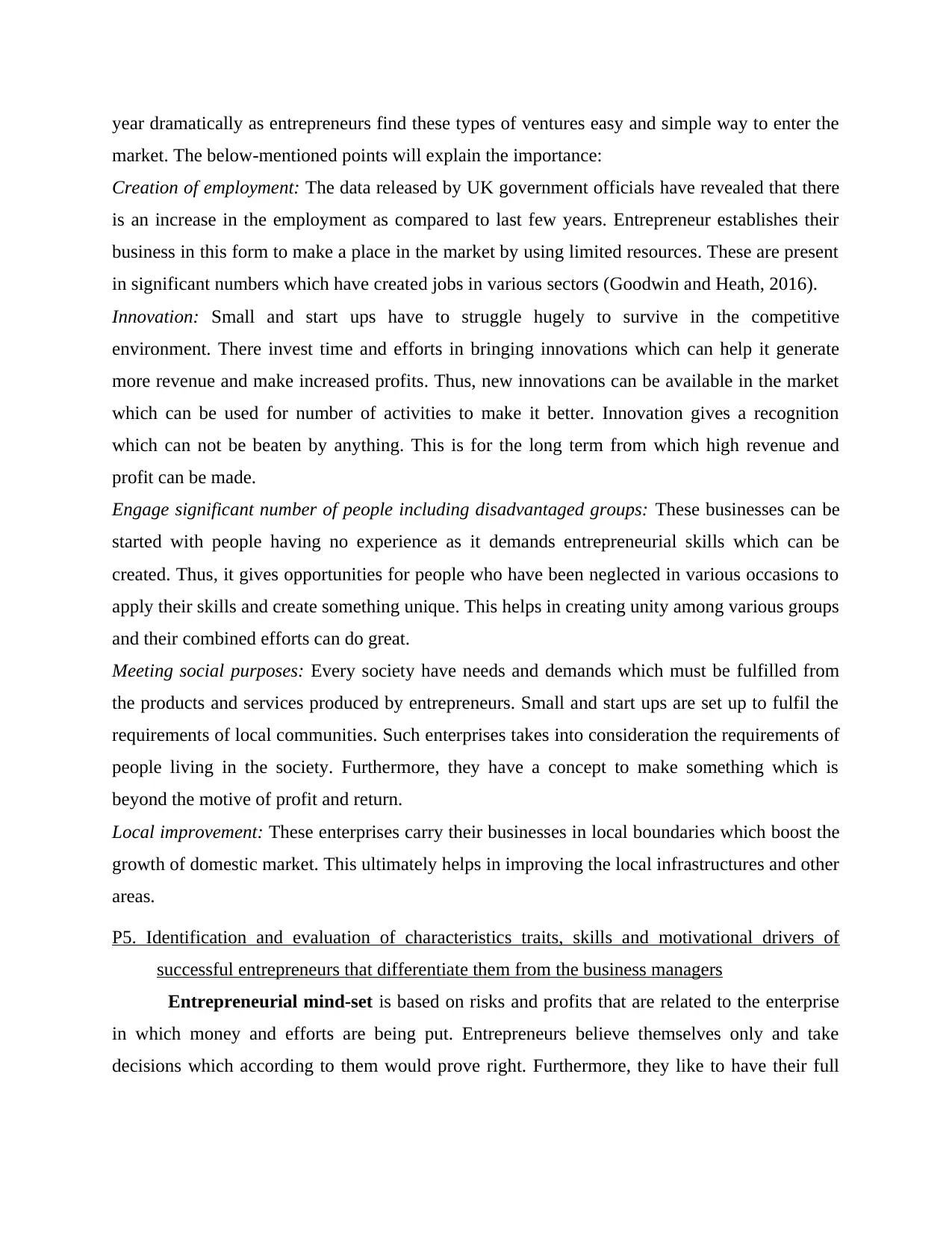
year dramatically as entrepreneurs find these types of ventures easy and simple way to enter the
market. The below-mentioned points will explain the importance:
Creation of employment: The data released by UK government officials have revealed that there
is an increase in the employment as compared to last few years. Entrepreneur establishes their
business in this form to make a place in the market by using limited resources. These are present
in significant numbers which have created jobs in various sectors (Goodwin and Heath, 2016).
Innovation: Small and start ups have to struggle hugely to survive in the competitive
environment. There invest time and efforts in bringing innovations which can help it generate
more revenue and make increased profits. Thus, new innovations can be available in the market
which can be used for number of activities to make it better. Innovation gives a recognition
which can not be beaten by anything. This is for the long term from which high revenue and
profit can be made.
Engage significant number of people including disadvantaged groups: These businesses can be
started with people having no experience as it demands entrepreneurial skills which can be
created. Thus, it gives opportunities for people who have been neglected in various occasions to
apply their skills and create something unique. This helps in creating unity among various groups
and their combined efforts can do great.
Meeting social purposes: Every society have needs and demands which must be fulfilled from
the products and services produced by entrepreneurs. Small and start ups are set up to fulfil the
requirements of local communities. Such enterprises takes into consideration the requirements of
people living in the society. Furthermore, they have a concept to make something which is
beyond the motive of profit and return.
Local improvement: These enterprises carry their businesses in local boundaries which boost the
growth of domestic market. This ultimately helps in improving the local infrastructures and other
areas.
P5. Identification and evaluation of characteristics traits, skills and motivational drivers of
successful entrepreneurs that differentiate them from the business managers
Entrepreneurial mind-set is based on risks and profits that are related to the enterprise
in which money and efforts are being put. Entrepreneurs believe themselves only and take
decisions which according to them would prove right. Furthermore, they like to have their full
market. The below-mentioned points will explain the importance:
Creation of employment: The data released by UK government officials have revealed that there
is an increase in the employment as compared to last few years. Entrepreneur establishes their
business in this form to make a place in the market by using limited resources. These are present
in significant numbers which have created jobs in various sectors (Goodwin and Heath, 2016).
Innovation: Small and start ups have to struggle hugely to survive in the competitive
environment. There invest time and efforts in bringing innovations which can help it generate
more revenue and make increased profits. Thus, new innovations can be available in the market
which can be used for number of activities to make it better. Innovation gives a recognition
which can not be beaten by anything. This is for the long term from which high revenue and
profit can be made.
Engage significant number of people including disadvantaged groups: These businesses can be
started with people having no experience as it demands entrepreneurial skills which can be
created. Thus, it gives opportunities for people who have been neglected in various occasions to
apply their skills and create something unique. This helps in creating unity among various groups
and their combined efforts can do great.
Meeting social purposes: Every society have needs and demands which must be fulfilled from
the products and services produced by entrepreneurs. Small and start ups are set up to fulfil the
requirements of local communities. Such enterprises takes into consideration the requirements of
people living in the society. Furthermore, they have a concept to make something which is
beyond the motive of profit and return.
Local improvement: These enterprises carry their businesses in local boundaries which boost the
growth of domestic market. This ultimately helps in improving the local infrastructures and other
areas.
P5. Identification and evaluation of characteristics traits, skills and motivational drivers of
successful entrepreneurs that differentiate them from the business managers
Entrepreneurial mind-set is based on risks and profits that are related to the enterprise
in which money and efforts are being put. Entrepreneurs believe themselves only and take
decisions which according to them would prove right. Furthermore, they like to have their full
Paraphrase This Document
Need a fresh take? Get an instant paraphrase of this document with our AI Paraphraser
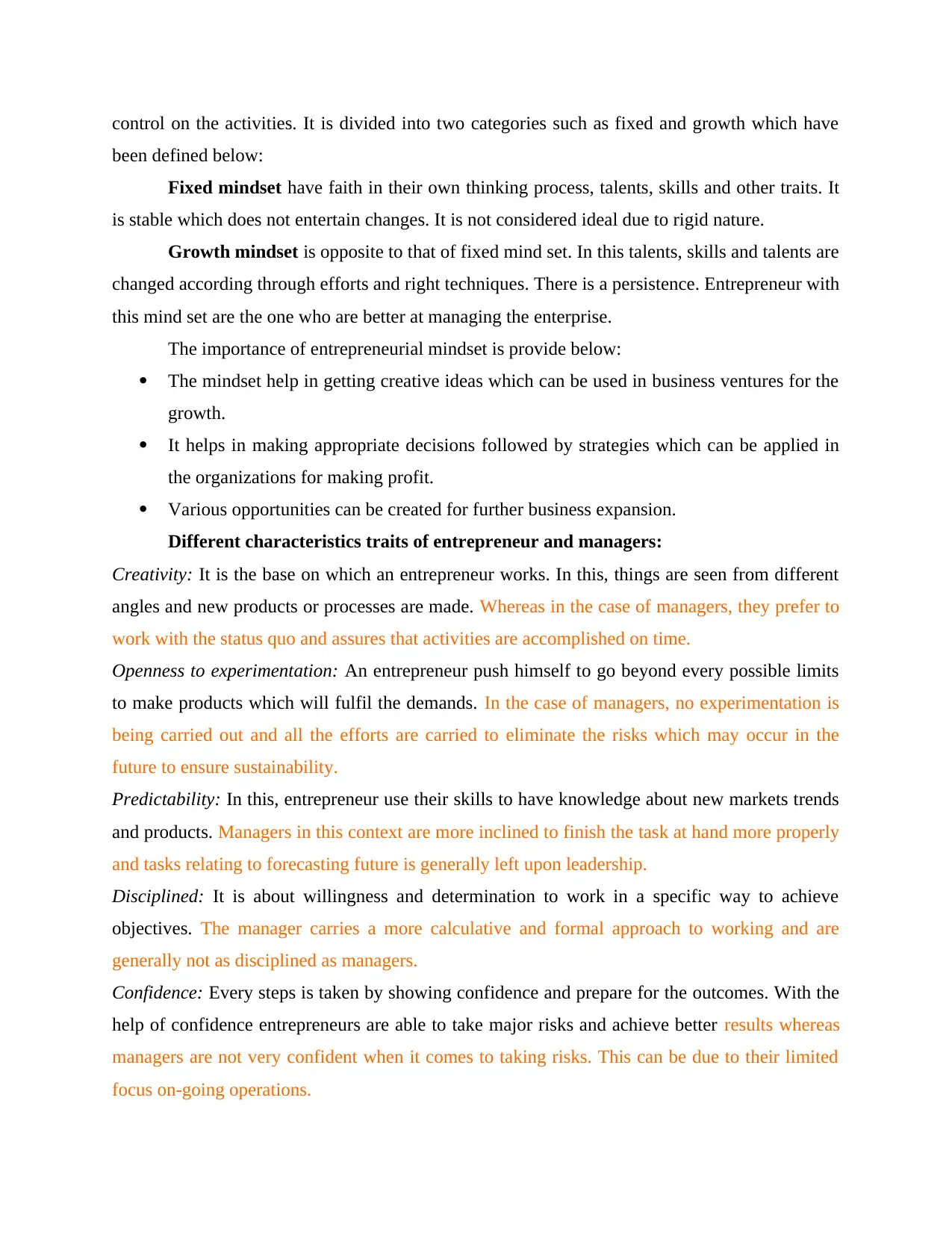
control on the activities. It is divided into two categories such as fixed and growth which have
been defined below:
Fixed mindset have faith in their own thinking process, talents, skills and other traits. It
is stable which does not entertain changes. It is not considered ideal due to rigid nature.
Growth mindset is opposite to that of fixed mind set. In this talents, skills and talents are
changed according through efforts and right techniques. There is a persistence. Entrepreneur with
this mind set are the one who are better at managing the enterprise.
The importance of entrepreneurial mindset is provide below:
The mindset help in getting creative ideas which can be used in business ventures for the
growth.
It helps in making appropriate decisions followed by strategies which can be applied in
the organizations for making profit.
Various opportunities can be created for further business expansion.
Different characteristics traits of entrepreneur and managers:
Creativity: It is the base on which an entrepreneur works. In this, things are seen from different
angles and new products or processes are made. Whereas in the case of managers, they prefer to
work with the status quo and assures that activities are accomplished on time.
Openness to experimentation: An entrepreneur push himself to go beyond every possible limits
to make products which will fulfil the demands. In the case of managers, no experimentation is
being carried out and all the efforts are carried to eliminate the risks which may occur in the
future to ensure sustainability.
Predictability: In this, entrepreneur use their skills to have knowledge about new markets trends
and products. Managers in this context are more inclined to finish the task at hand more properly
and tasks relating to forecasting future is generally left upon leadership.
Disciplined: It is about willingness and determination to work in a specific way to achieve
objectives. The manager carries a more calculative and formal approach to working and are
generally not as disciplined as managers.
Confidence: Every steps is taken by showing confidence and prepare for the outcomes. With the
help of confidence entrepreneurs are able to take major risks and achieve better results whereas
managers are not very confident when it comes to taking risks. This can be due to their limited
focus on-going operations.
been defined below:
Fixed mindset have faith in their own thinking process, talents, skills and other traits. It
is stable which does not entertain changes. It is not considered ideal due to rigid nature.
Growth mindset is opposite to that of fixed mind set. In this talents, skills and talents are
changed according through efforts and right techniques. There is a persistence. Entrepreneur with
this mind set are the one who are better at managing the enterprise.
The importance of entrepreneurial mindset is provide below:
The mindset help in getting creative ideas which can be used in business ventures for the
growth.
It helps in making appropriate decisions followed by strategies which can be applied in
the organizations for making profit.
Various opportunities can be created for further business expansion.
Different characteristics traits of entrepreneur and managers:
Creativity: It is the base on which an entrepreneur works. In this, things are seen from different
angles and new products or processes are made. Whereas in the case of managers, they prefer to
work with the status quo and assures that activities are accomplished on time.
Openness to experimentation: An entrepreneur push himself to go beyond every possible limits
to make products which will fulfil the demands. In the case of managers, no experimentation is
being carried out and all the efforts are carried to eliminate the risks which may occur in the
future to ensure sustainability.
Predictability: In this, entrepreneur use their skills to have knowledge about new markets trends
and products. Managers in this context are more inclined to finish the task at hand more properly
and tasks relating to forecasting future is generally left upon leadership.
Disciplined: It is about willingness and determination to work in a specific way to achieve
objectives. The manager carries a more calculative and formal approach to working and are
generally not as disciplined as managers.
Confidence: Every steps is taken by showing confidence and prepare for the outcomes. With the
help of confidence entrepreneurs are able to take major risks and achieve better results whereas
managers are not very confident when it comes to taking risks. This can be due to their limited
focus on-going operations.
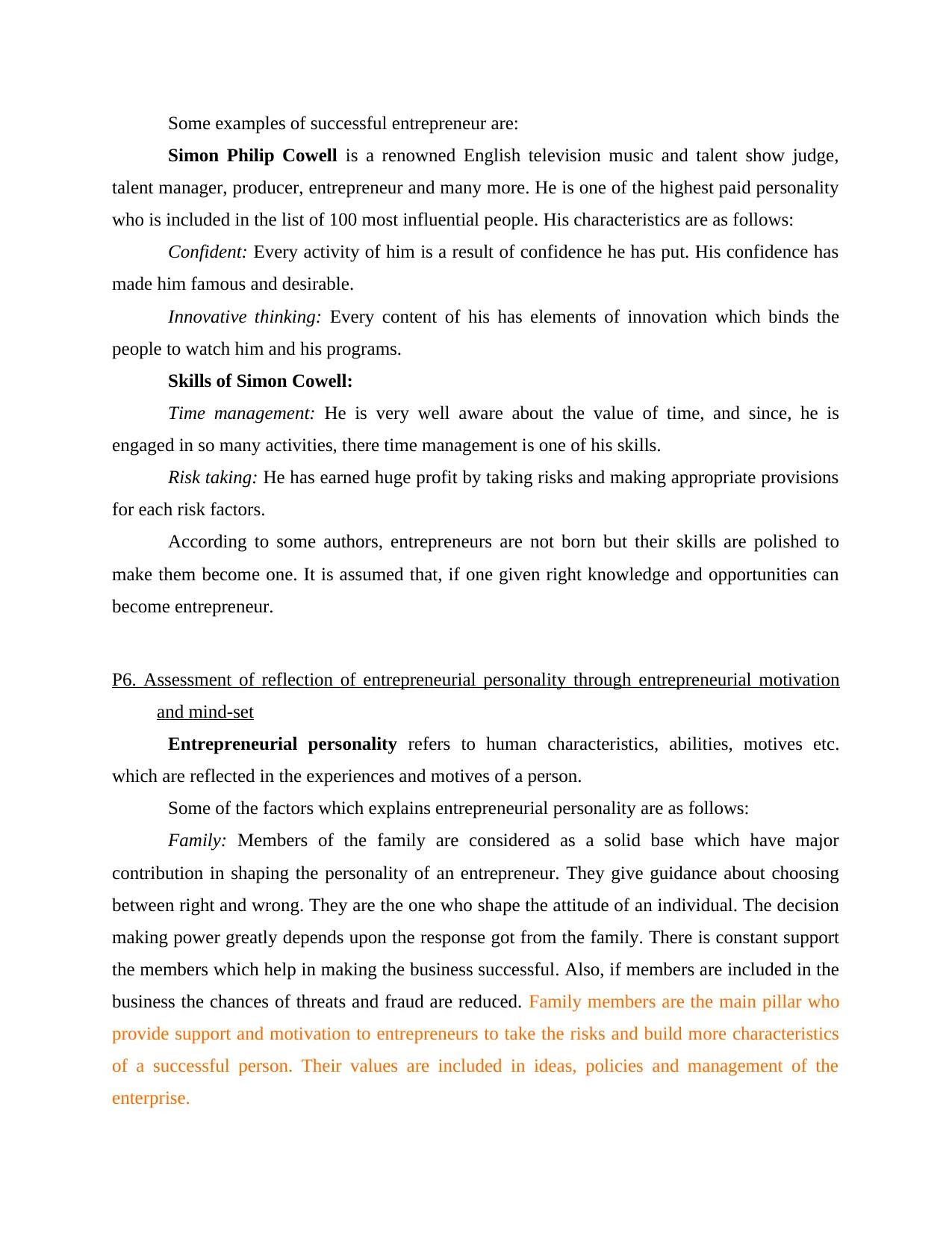
Some examples of successful entrepreneur are:
Simon Philip Cowell is a renowned English television music and talent show judge,
talent manager, producer, entrepreneur and many more. He is one of the highest paid personality
who is included in the list of 100 most influential people. His characteristics are as follows:
Confident: Every activity of him is a result of confidence he has put. His confidence has
made him famous and desirable.
Innovative thinking: Every content of his has elements of innovation which binds the
people to watch him and his programs.
Skills of Simon Cowell:
Time management: He is very well aware about the value of time, and since, he is
engaged in so many activities, there time management is one of his skills.
Risk taking: He has earned huge profit by taking risks and making appropriate provisions
for each risk factors.
According to some authors, entrepreneurs are not born but their skills are polished to
make them become one. It is assumed that, if one given right knowledge and opportunities can
become entrepreneur.
P6. Assessment of reflection of entrepreneurial personality through entrepreneurial motivation
and mind-set
Entrepreneurial personality refers to human characteristics, abilities, motives etc.
which are reflected in the experiences and motives of a person.
Some of the factors which explains entrepreneurial personality are as follows:
Family: Members of the family are considered as a solid base which have major
contribution in shaping the personality of an entrepreneur. They give guidance about choosing
between right and wrong. They are the one who shape the attitude of an individual. The decision
making power greatly depends upon the response got from the family. There is constant support
the members which help in making the business successful. Also, if members are included in the
business the chances of threats and fraud are reduced. Family members are the main pillar who
provide support and motivation to entrepreneurs to take the risks and build more characteristics
of a successful person. Their values are included in ideas, policies and management of the
enterprise.
Simon Philip Cowell is a renowned English television music and talent show judge,
talent manager, producer, entrepreneur and many more. He is one of the highest paid personality
who is included in the list of 100 most influential people. His characteristics are as follows:
Confident: Every activity of him is a result of confidence he has put. His confidence has
made him famous and desirable.
Innovative thinking: Every content of his has elements of innovation which binds the
people to watch him and his programs.
Skills of Simon Cowell:
Time management: He is very well aware about the value of time, and since, he is
engaged in so many activities, there time management is one of his skills.
Risk taking: He has earned huge profit by taking risks and making appropriate provisions
for each risk factors.
According to some authors, entrepreneurs are not born but their skills are polished to
make them become one. It is assumed that, if one given right knowledge and opportunities can
become entrepreneur.
P6. Assessment of reflection of entrepreneurial personality through entrepreneurial motivation
and mind-set
Entrepreneurial personality refers to human characteristics, abilities, motives etc.
which are reflected in the experiences and motives of a person.
Some of the factors which explains entrepreneurial personality are as follows:
Family: Members of the family are considered as a solid base which have major
contribution in shaping the personality of an entrepreneur. They give guidance about choosing
between right and wrong. They are the one who shape the attitude of an individual. The decision
making power greatly depends upon the response got from the family. There is constant support
the members which help in making the business successful. Also, if members are included in the
business the chances of threats and fraud are reduced. Family members are the main pillar who
provide support and motivation to entrepreneurs to take the risks and build more characteristics
of a successful person. Their values are included in ideas, policies and management of the
enterprise.
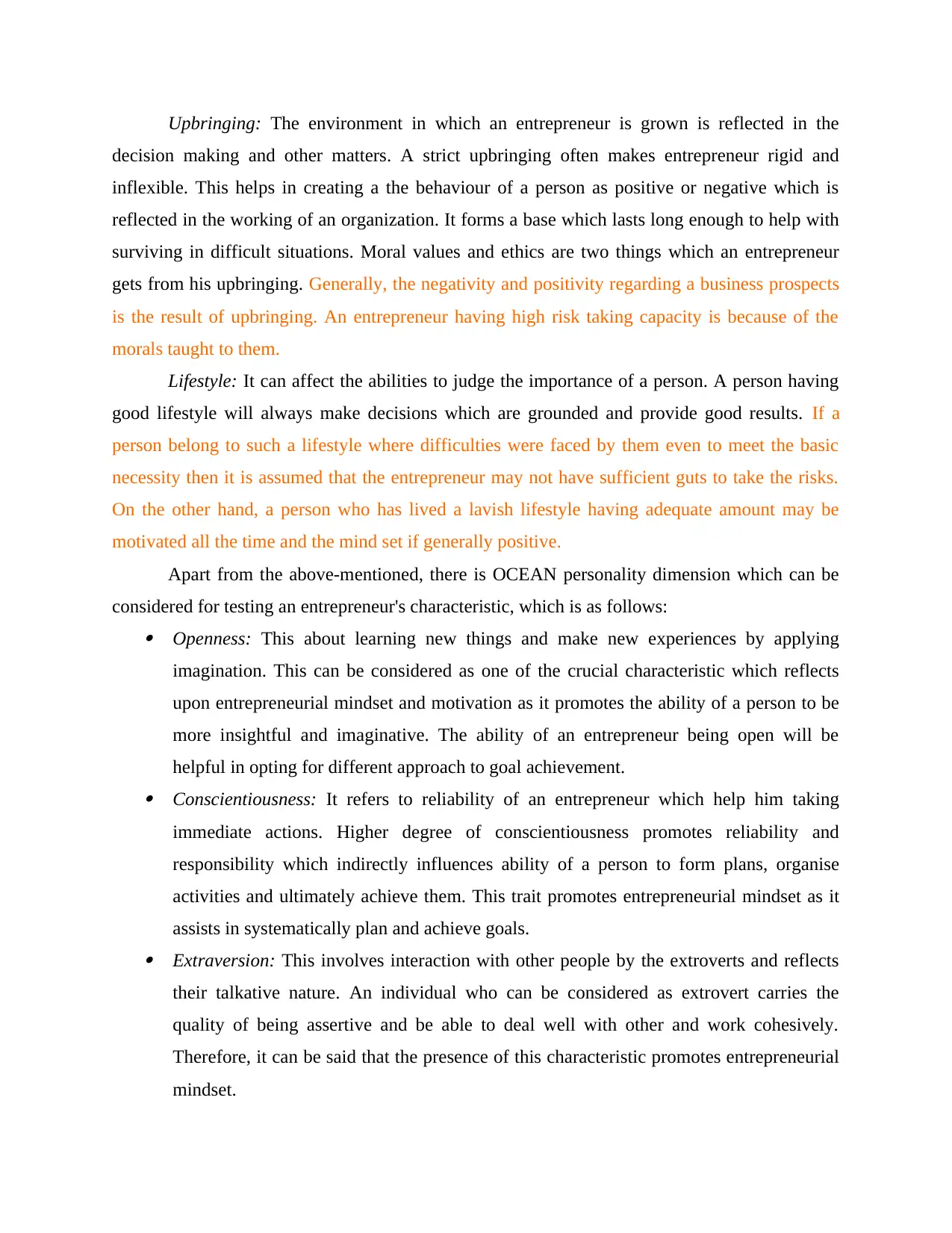
Upbringing: The environment in which an entrepreneur is grown is reflected in the
decision making and other matters. A strict upbringing often makes entrepreneur rigid and
inflexible. This helps in creating a the behaviour of a person as positive or negative which is
reflected in the working of an organization. It forms a base which lasts long enough to help with
surviving in difficult situations. Moral values and ethics are two things which an entrepreneur
gets from his upbringing. Generally, the negativity and positivity regarding a business prospects
is the result of upbringing. An entrepreneur having high risk taking capacity is because of the
morals taught to them.
Lifestyle: It can affect the abilities to judge the importance of a person. A person having
good lifestyle will always make decisions which are grounded and provide good results. If a
person belong to such a lifestyle where difficulties were faced by them even to meet the basic
necessity then it is assumed that the entrepreneur may not have sufficient guts to take the risks.
On the other hand, a person who has lived a lavish lifestyle having adequate amount may be
motivated all the time and the mind set if generally positive.
Apart from the above-mentioned, there is OCEAN personality dimension which can be
considered for testing an entrepreneur's characteristic, which is as follows: Openness: This about learning new things and make new experiences by applying
imagination. This can be considered as one of the crucial characteristic which reflects
upon entrepreneurial mindset and motivation as it promotes the ability of a person to be
more insightful and imaginative. The ability of an entrepreneur being open will be
helpful in opting for different approach to goal achievement. Conscientiousness: It refers to reliability of an entrepreneur which help him taking
immediate actions. Higher degree of conscientiousness promotes reliability and
responsibility which indirectly influences ability of a person to form plans, organise
activities and ultimately achieve them. This trait promotes entrepreneurial mindset as it
assists in systematically plan and achieve goals. Extraversion: This involves interaction with other people by the extroverts and reflects
their talkative nature. An individual who can be considered as extrovert carries the
quality of being assertive and be able to deal well with other and work cohesively.
Therefore, it can be said that the presence of this characteristic promotes entrepreneurial
mindset.
decision making and other matters. A strict upbringing often makes entrepreneur rigid and
inflexible. This helps in creating a the behaviour of a person as positive or negative which is
reflected in the working of an organization. It forms a base which lasts long enough to help with
surviving in difficult situations. Moral values and ethics are two things which an entrepreneur
gets from his upbringing. Generally, the negativity and positivity regarding a business prospects
is the result of upbringing. An entrepreneur having high risk taking capacity is because of the
morals taught to them.
Lifestyle: It can affect the abilities to judge the importance of a person. A person having
good lifestyle will always make decisions which are grounded and provide good results. If a
person belong to such a lifestyle where difficulties were faced by them even to meet the basic
necessity then it is assumed that the entrepreneur may not have sufficient guts to take the risks.
On the other hand, a person who has lived a lavish lifestyle having adequate amount may be
motivated all the time and the mind set if generally positive.
Apart from the above-mentioned, there is OCEAN personality dimension which can be
considered for testing an entrepreneur's characteristic, which is as follows: Openness: This about learning new things and make new experiences by applying
imagination. This can be considered as one of the crucial characteristic which reflects
upon entrepreneurial mindset and motivation as it promotes the ability of a person to be
more insightful and imaginative. The ability of an entrepreneur being open will be
helpful in opting for different approach to goal achievement. Conscientiousness: It refers to reliability of an entrepreneur which help him taking
immediate actions. Higher degree of conscientiousness promotes reliability and
responsibility which indirectly influences ability of a person to form plans, organise
activities and ultimately achieve them. This trait promotes entrepreneurial mindset as it
assists in systematically plan and achieve goals. Extraversion: This involves interaction with other people by the extroverts and reflects
their talkative nature. An individual who can be considered as extrovert carries the
quality of being assertive and be able to deal well with other and work cohesively.
Therefore, it can be said that the presence of this characteristic promotes entrepreneurial
mindset.
Secure Best Marks with AI Grader
Need help grading? Try our AI Grader for instant feedback on your assignments.
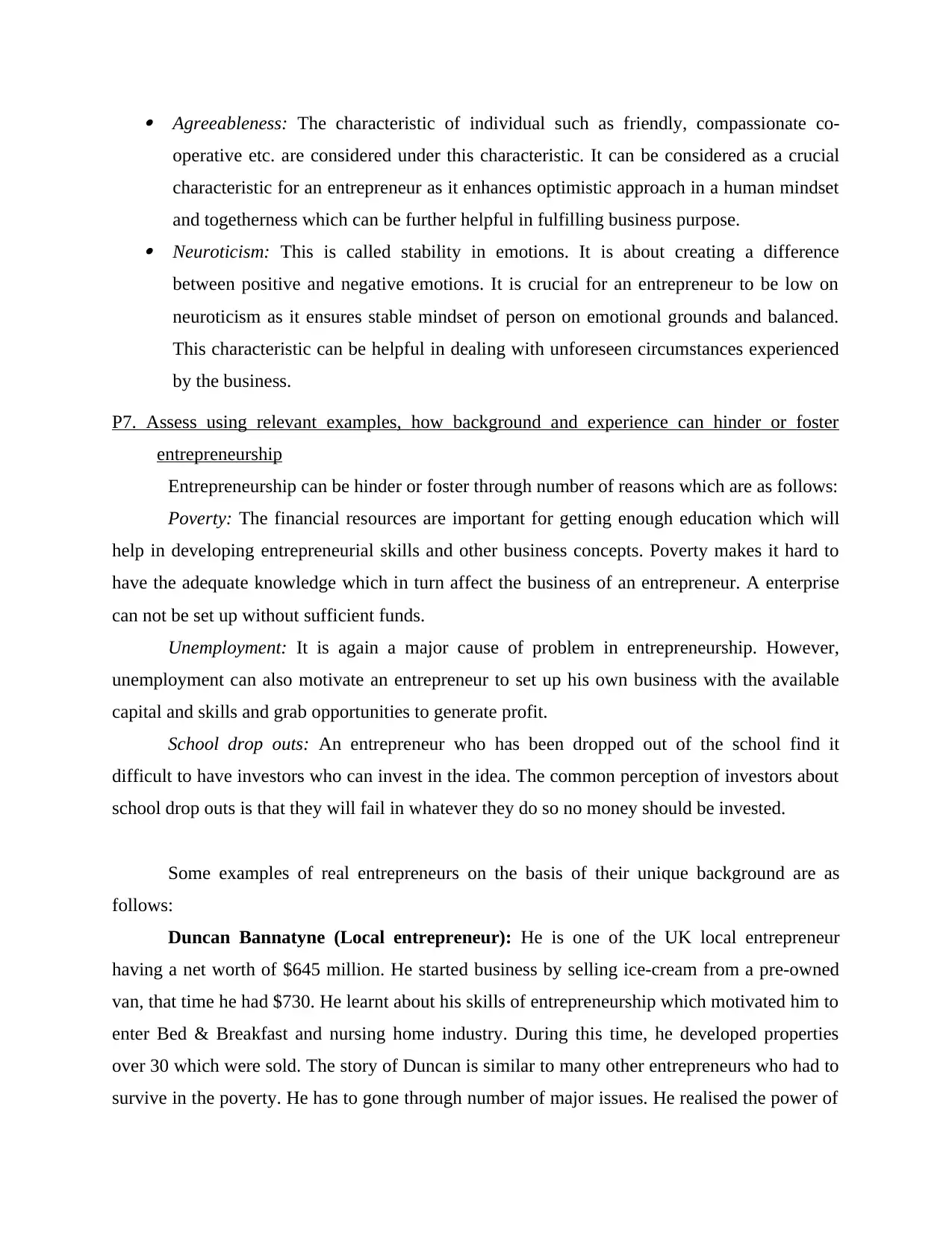
Agreeableness: The characteristic of individual such as friendly, compassionate co-
operative etc. are considered under this characteristic. It can be considered as a crucial
characteristic for an entrepreneur as it enhances optimistic approach in a human mindset
and togetherness which can be further helpful in fulfilling business purpose. Neuroticism: This is called stability in emotions. It is about creating a difference
between positive and negative emotions. It is crucial for an entrepreneur to be low on
neuroticism as it ensures stable mindset of person on emotional grounds and balanced.
This characteristic can be helpful in dealing with unforeseen circumstances experienced
by the business.
P7. Assess using relevant examples, how background and experience can hinder or foster
entrepreneurship
Entrepreneurship can be hinder or foster through number of reasons which are as follows:
Poverty: The financial resources are important for getting enough education which will
help in developing entrepreneurial skills and other business concepts. Poverty makes it hard to
have the adequate knowledge which in turn affect the business of an entrepreneur. A enterprise
can not be set up without sufficient funds.
Unemployment: It is again a major cause of problem in entrepreneurship. However,
unemployment can also motivate an entrepreneur to set up his own business with the available
capital and skills and grab opportunities to generate profit.
School drop outs: An entrepreneur who has been dropped out of the school find it
difficult to have investors who can invest in the idea. The common perception of investors about
school drop outs is that they will fail in whatever they do so no money should be invested.
Some examples of real entrepreneurs on the basis of their unique background are as
follows:
Duncan Bannatyne (Local entrepreneur): He is one of the UK local entrepreneur
having a net worth of $645 million. He started business by selling ice-cream from a pre-owned
van, that time he had $730. He learnt about his skills of entrepreneurship which motivated him to
enter Bed & Breakfast and nursing home industry. During this time, he developed properties
over 30 which were sold. The story of Duncan is similar to many other entrepreneurs who had to
survive in the poverty. He has to gone through number of major issues. He realised the power of
operative etc. are considered under this characteristic. It can be considered as a crucial
characteristic for an entrepreneur as it enhances optimistic approach in a human mindset
and togetherness which can be further helpful in fulfilling business purpose. Neuroticism: This is called stability in emotions. It is about creating a difference
between positive and negative emotions. It is crucial for an entrepreneur to be low on
neuroticism as it ensures stable mindset of person on emotional grounds and balanced.
This characteristic can be helpful in dealing with unforeseen circumstances experienced
by the business.
P7. Assess using relevant examples, how background and experience can hinder or foster
entrepreneurship
Entrepreneurship can be hinder or foster through number of reasons which are as follows:
Poverty: The financial resources are important for getting enough education which will
help in developing entrepreneurial skills and other business concepts. Poverty makes it hard to
have the adequate knowledge which in turn affect the business of an entrepreneur. A enterprise
can not be set up without sufficient funds.
Unemployment: It is again a major cause of problem in entrepreneurship. However,
unemployment can also motivate an entrepreneur to set up his own business with the available
capital and skills and grab opportunities to generate profit.
School drop outs: An entrepreneur who has been dropped out of the school find it
difficult to have investors who can invest in the idea. The common perception of investors about
school drop outs is that they will fail in whatever they do so no money should be invested.
Some examples of real entrepreneurs on the basis of their unique background are as
follows:
Duncan Bannatyne (Local entrepreneur): He is one of the UK local entrepreneur
having a net worth of $645 million. He started business by selling ice-cream from a pre-owned
van, that time he had $730. He learnt about his skills of entrepreneurship which motivated him to
enter Bed & Breakfast and nursing home industry. During this time, he developed properties
over 30 which were sold. The story of Duncan is similar to many other entrepreneurs who had to
survive in the poverty. He has to gone through number of major issues. He realised the power of
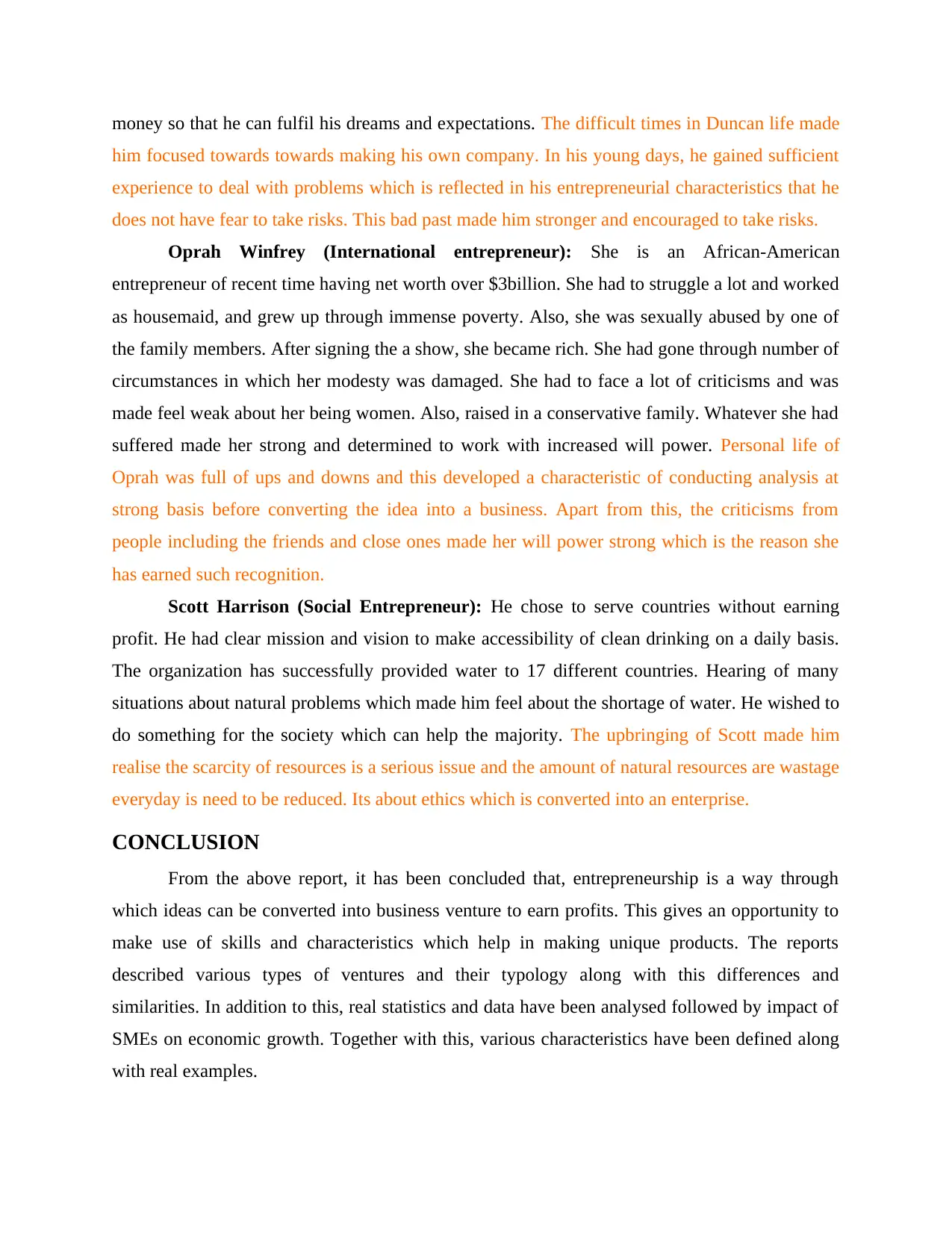
money so that he can fulfil his dreams and expectations. The difficult times in Duncan life made
him focused towards towards making his own company. In his young days, he gained sufficient
experience to deal with problems which is reflected in his entrepreneurial characteristics that he
does not have fear to take risks. This bad past made him stronger and encouraged to take risks.
Oprah Winfrey (International entrepreneur): She is an African-American
entrepreneur of recent time having net worth over $3billion. She had to struggle a lot and worked
as housemaid, and grew up through immense poverty. Also, she was sexually abused by one of
the family members. After signing the a show, she became rich. She had gone through number of
circumstances in which her modesty was damaged. She had to face a lot of criticisms and was
made feel weak about her being women. Also, raised in a conservative family. Whatever she had
suffered made her strong and determined to work with increased will power. Personal life of
Oprah was full of ups and downs and this developed a characteristic of conducting analysis at
strong basis before converting the idea into a business. Apart from this, the criticisms from
people including the friends and close ones made her will power strong which is the reason she
has earned such recognition.
Scott Harrison (Social Entrepreneur): He chose to serve countries without earning
profit. He had clear mission and vision to make accessibility of clean drinking on a daily basis.
The organization has successfully provided water to 17 different countries. Hearing of many
situations about natural problems which made him feel about the shortage of water. He wished to
do something for the society which can help the majority. The upbringing of Scott made him
realise the scarcity of resources is a serious issue and the amount of natural resources are wastage
everyday is need to be reduced. Its about ethics which is converted into an enterprise.
CONCLUSION
From the above report, it has been concluded that, entrepreneurship is a way through
which ideas can be converted into business venture to earn profits. This gives an opportunity to
make use of skills and characteristics which help in making unique products. The reports
described various types of ventures and their typology along with this differences and
similarities. In addition to this, real statistics and data have been analysed followed by impact of
SMEs on economic growth. Together with this, various characteristics have been defined along
with real examples.
him focused towards towards making his own company. In his young days, he gained sufficient
experience to deal with problems which is reflected in his entrepreneurial characteristics that he
does not have fear to take risks. This bad past made him stronger and encouraged to take risks.
Oprah Winfrey (International entrepreneur): She is an African-American
entrepreneur of recent time having net worth over $3billion. She had to struggle a lot and worked
as housemaid, and grew up through immense poverty. Also, she was sexually abused by one of
the family members. After signing the a show, she became rich. She had gone through number of
circumstances in which her modesty was damaged. She had to face a lot of criticisms and was
made feel weak about her being women. Also, raised in a conservative family. Whatever she had
suffered made her strong and determined to work with increased will power. Personal life of
Oprah was full of ups and downs and this developed a characteristic of conducting analysis at
strong basis before converting the idea into a business. Apart from this, the criticisms from
people including the friends and close ones made her will power strong which is the reason she
has earned such recognition.
Scott Harrison (Social Entrepreneur): He chose to serve countries without earning
profit. He had clear mission and vision to make accessibility of clean drinking on a daily basis.
The organization has successfully provided water to 17 different countries. Hearing of many
situations about natural problems which made him feel about the shortage of water. He wished to
do something for the society which can help the majority. The upbringing of Scott made him
realise the scarcity of resources is a serious issue and the amount of natural resources are wastage
everyday is need to be reduced. Its about ethics which is converted into an enterprise.
CONCLUSION
From the above report, it has been concluded that, entrepreneurship is a way through
which ideas can be converted into business venture to earn profits. This gives an opportunity to
make use of skills and characteristics which help in making unique products. The reports
described various types of ventures and their typology along with this differences and
similarities. In addition to this, real statistics and data have been analysed followed by impact of
SMEs on economic growth. Together with this, various characteristics have been defined along
with real examples.

Paraphrase This Document
Need a fresh take? Get an instant paraphrase of this document with our AI Paraphraser
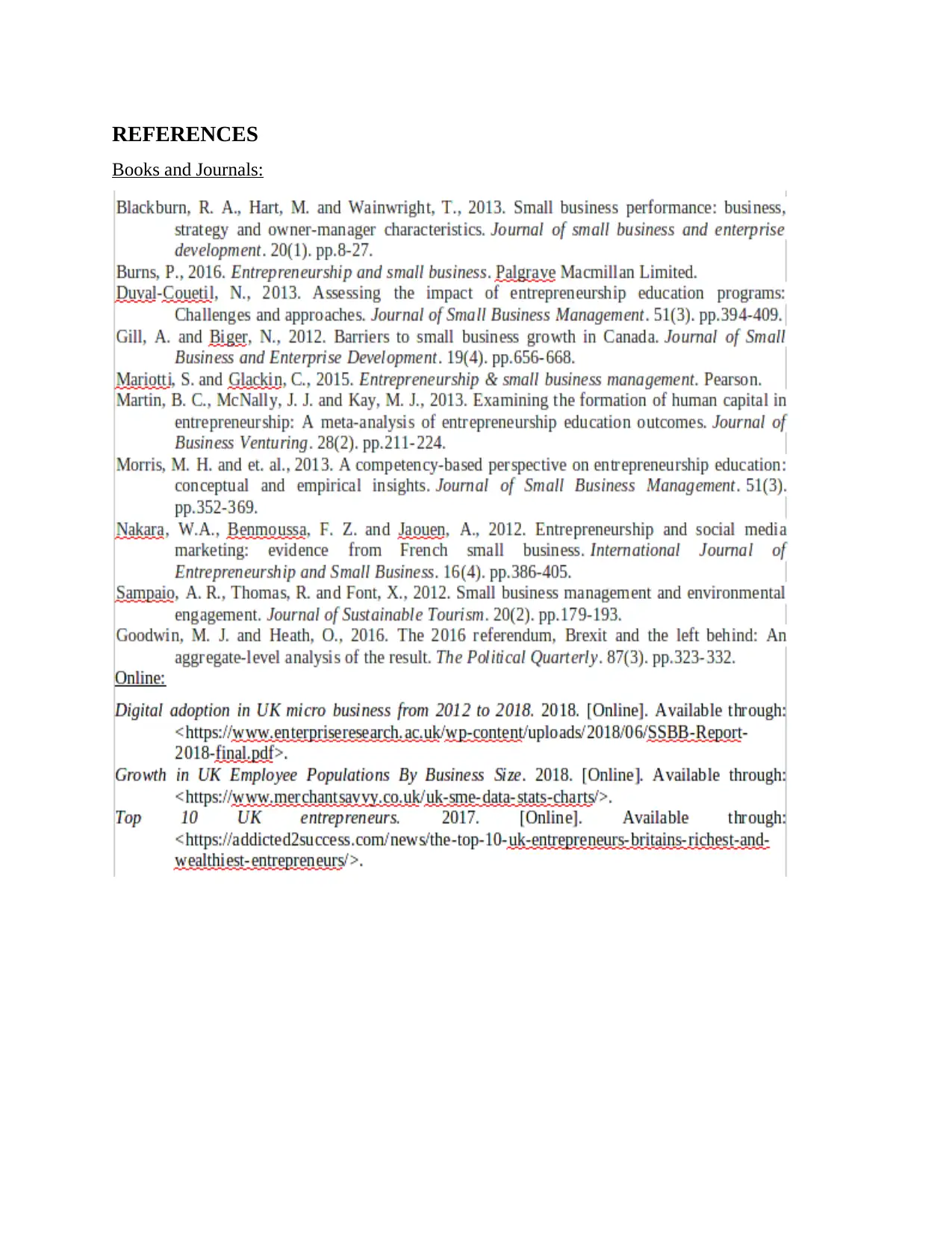
REFERENCES
Books and Journals:
Books and Journals:
1 out of 20
Related Documents
Your All-in-One AI-Powered Toolkit for Academic Success.
+13062052269
info@desklib.com
Available 24*7 on WhatsApp / Email
![[object Object]](/_next/static/media/star-bottom.7253800d.svg)
Unlock your academic potential
© 2024 | Zucol Services PVT LTD | All rights reserved.




